#and b) stop believing the only categories of person in the world are 'bully' and 'victim'
Text
I only watched the first four episodes of season four and have only the vaguest notion of what happens in the rest of it. And I've been told that I misread what was going on and that that's not where the plot was going. But.
I cannot get over the wasted potential of not having Vecna's Curse target, specifically, people who feel guilt over being responsible for another person's death. (Even though they're not, actually, responsible.)
Like. Apparently what was going on with Chrissy was an eating disorder. I misread the coding on that hard in the early episodes, and thought that she'd recently been to Chicago to see Jane. And if she had...apparently Jason was also super religious? If Chrissy had had an abortion, because they'd been having sex, then that makes a whole thematic reinforcement to his hypocrisy and whatever half-baked point the show sort of made gestures at making about the Satanic Panic.
Then there's Fred and his friend. Whatsisface in Pennhurst, the older Creel, and the baby in the house he ordered the bombing on. Max and Billy. Nancy and Barb. (Hell, Steve and Barb if you really want to play to your audience.) You could even use that to tie in the adults' storyline - we haven't heard about Hopper's guilt over Sara in a minute!
And all of that would dovetail nicely into motive. Because apparently "Vecna" is, in fact, Henry Creel, is in fact Experiment 001? Who [something something something] psychic powers [something something] horrific child abuse [something something something] massacre at the Hawkins lab [something something] Always Chaotic Axe-Crazy?
But it would make so much sense for a child who'd been ripped from his family, survived awful mistreatment in the name of the greater good, and been witness to the deaths of other kids just like him due to the actions of people who didn't seem to care, who didn't seem to see it as their fault, to be lashing out at anybody he perceived to be like those people.
It would have made sense. It would have been a reason. It would have drawn a throughline from the Big Bad's motivation through to Our Heroes and their actions. It would have given them so much room to work with consequences of the earlier seasons coming back to bite Our Heroes, and could have gone in some really good directions about exploring survivor's guilt and whether these characters really were responsible for any of the deaths they take as their responsibility. And also about institutional hurt and how sometimes, people who have no other option and no way to reach the people who actually hurt them will just aim their pain at anyone in reach, anyone who looks enough like the person who hurt them if you squint and hold your tongue just right, and how, to make actual change against the systems that hurt people, we all need to keep in mind who the real enemy is. It could have been so good.
#stranger things#i have been working on former heroes and I have. thoughts.#but for any of that to have happened the duffers would need to a) give half a damn about characterisation#and b) stop believing the only categories of person in the world are 'bully' and 'victim'#and that the only way to stop being one is to become the other#i am also still frothing at the mouth about the fact that they apparently. made the Big Bad's weakness music.#put in a new character who is LEAD GUITARIST in a BAND#put him into MOST OF THE EPISODES in an IMPORTANT PLOT-RELEVANT ROLE#and then NEVER. HAD. HIM HAVE TO PLAY SOMEBODY'S SONG. ON THE GUITAR. TO SAVE THEM FROM THE BIG BAD.#WHAT THE FUCK WERE THEY *DOING* FOR THOSE TWO YEARS OF MANDATORY SHUTDOWN#BECAUSE IT WASN'T 'SCRIPT REVISION' LIKE THEY CLAIMED#how did fucking SUPERNATURAL handle this better!??!?!?#okay. i'm okay. i'm good.
27 notes
·
View notes
Text
ON BEING HONEST AND WHY I THINK SIMON WILL BE THE FIRST TO SAY “I LOVE YOU”
Two things sparked this meta:
Baz yelling “you’re so beautiful” to Simon, but Simon not hearing it— the moment that lives rent-free in my head 24/7
Rainbow’s recent Fall for the Book interview, when she said that she thinks that Baz is “settling for Simon” in Wayward Son
Here’s something we all know: our guys really suck at saying nice things out loud to each other. For two people are constantly thinking nauseatingly sweet and loving things about each other, they almost never actually verbalize them.
I ended up going through a lot of quotes and tracking some of the nice things that they actually do say to each other, and I’ll offer some very r a m b l i n g thoughts on what I think Simon and Baz’s respective paths indicate for AWTWB.
I was interested in the intersection of when Simon and Baz are being honest to each other (aka saying some of the nice things that they’re always thinking) with when Simon and Baz are being honest about themselves (aka self-acceptance).
TL;DR, my prediction for their path through honesty is:
Simon’s self-acceptance (which starts at the end of WS)
Simon’s honesty to Baz re: love
Baz’s honesty to Simon re: love
Baz’s self acceptance
**Below the cut because it got super long, yikes**
Phase 1: Simon being nice/honest in CO
The first nice-ish interaction between Simon and Baz in Carry On is when Simon follows Baz up to the Mage’s office, and they find Baz’s baby photo:
“Here,” [Simon] says softly, holding it out to me. “I’m… sorry.” (204)
Simon tones down his initial hostility in this scene after he sees the photo. This moment, along with Natasha’s visitation, catalyzes a real change in how Simon views Baz, and it’s indicative of the larger shift (vulnerability → Simon seeing Baz as more than his enemy → Baz wearing jeans → oops I love him). This trajectory continues during their truce-- there are still a few moments of hostility, but honestly on the whole, Simon is pretty nice to Baz:
“You don’t want to hurt me,” I say, trying to push him back. “Isn’t that right? I’m sorry. Look at me, I’m sorry.” (210)
“I’ll help you,” he says (217)
“Baz,” I yell. “No! You’re flammable!” (238)
All of this culminates in the kisses in the forest, and Simon says a few more nice and affirming things around that point:
“They say your soul dies.” “That’s tosh,” he says. (300)
“You’re not a monster,” I say. His face is cold as a corpse in my hand. “I was wrong. All those years. You’re a bully. And a snob. And a complete arsehold. But you’re not one of them.” (339)
“I won’t,” I say. I’ve never turned my back on you. And I’m not starting now.” (340)
Something that stood out to me after reviewing these moments is that Simon’s shift from enemies to lovers is actually pretty linear. As he learns more about Baz during their truce and they grow closer, Simon hates Baz less and consequently says nicer things to him, until he ultimately realizes he doesn’t hate Baz at all, so he kisses him and asks him to be his boyfriend. Weirdly logical behavior for someone so thick. Simon is being pretty open and honest, and this makes sense because Simon understands himself pretty well at this point. His big crisis of character comes in the next book.
The thing is, at this point in Carry On, Baz has not said a single nice thing to Simon. The closest you could get is when he asks Simon to come to his house for Christmas, which is a great moment but is quickly muddled by their ensuing fight.
(awesome thoughts about that moment here)
Baz has acted nicely, but he has remained sarcastic and aloof even after Simon kisses him.
We get a few compliments of Simon’s power:
“You have to stop doing that.”
“What?”
“Godlike displays of magic.” (348)
“You’re the most powerful magician alive-- who’s ever lived, probably.” (355)
I won’t repeat @super-duper-twelve’s brilliant meta on this, but this category of compliment is not ultimately that useful for their general communication.
Simon keeps pushing, despite the cold walls Baz tries to put up, and he asks Baz to be his “terrible boyfriend.” Honestly, it astounds me how much confidence Simon must’ve had to just shoot his shot there, because Baz was not giving him a ton of reason to think he’d go for it. Me as simon would’ve definitely been like: ok cool, nice kiss, he definitely still hates me though.
Phase 2: Baz being nice/honest
I want to be clear: it’s perfectly understandable why Baz, a flawed fictional character, is not nice to Simon. His trajectory from enemies to lovers is completely different, because he’s spent years loving Simon while acting like his enemy. He’s had great practice at that, and it’s the most relatable thing ever that he is afraid of getting hurt when he’s believed Simon to be an impossible dream for so long. This is also understandable when viewed through the lens of self-acceptance because huge facets of Baz’s identity are constantly being covered up and ignored by himself or by the people close to him (vampire, gay). He knows himself, sure, but he’s a very long way from self-acceptance.
Anyway, Baz does actually agree to be Simon’s boyfriend, and we get a couple of honest Nice Things that they say to each other during that brief period.
Unfortunately, this mutual honesty/niceness is incredibly short lived, because everything changes quickly after this: Humdrum, Mage, Ebb, etc. Simon’s world falls apart, and Baz is there to comfort him, affirm him, and (finally) be honest and nice. Their whole dynamic turns on its head.
“You did it, didn’t you?” Baz whispers. “You defeated the Humdrum. You saved the day, you courageous fuck. You absolute nightmare.” (491)
“It’s going to be okay… it’s all right, love.” (492)
“You were the centre of my universe,” I say. “Everything else spun around you.” (506)
“Looking at you was like looking directly into the sun.” (507)
“You’re still Simon Snow. You’re still the hero of this story--” (507)
“It was brave. It was brave and selfless and clever. That’s who you are, Simon. And I’m not going to get bored with you.” (507)
“I choose you,” I say. “Simon Snow, I choose you.” (508)
To summarize and possibly oversimplify:
Up until the night of the Mage and Ebb’s death, Simon was the one pushing forward, being honest, and looking to break down the boundaries and walls between them.
After that point, Baz finally feels ready to be all in with Simon, and Simon retreats inward.
Phase 3: Wayward Son
We see this dynamic play out in Wayward Son, with almost no change throughout the whole book. Right from the very first chapter, Simon is thinking:
“Everything that happened with the Mage and the Hum-drum just made Baz more of who he was meant to be… He proved himself as a man and a magician. He proved himself right: The Mage really was evil! And I really was a fraud—’the worst Chosen One who’s ever been chosen,’ just like Baz used to say. He was right about me all along. “ (8)
I think it’s really notable that Simon can use his boyfriend’s words to justify his own worst self-doubts and self-loathings, because it indicates the consequences of them spending way more time insulting each other than ever being honest and affirming.
In Wayward Son, tender and honest moments between Simon and Baz are few and far between and mostly in the form of post-battle kisses. The only real communication that we see between them comes in flashbacks, wherein we see how much Simon has pulled back from Baz (the descriptions of his reaction to physical intimacy being one example of this).
Even when Baz says nice things to Simon and affirms him, Simon’s presumed depression largely keeps him from believing and internalizing those things (through no real fault of either person. Again, very understandable ways for both of these flawed characters with traumatic pasts to behave!!!!!). Baz yells, “you’re so beautiful” to Simon, and he doesn’t even hear him (a gutting moment that I consider indicative of the general dynamic between them throughout the book).
Now, we get to Rainbow’s comments about Baz “settling for Simon.” I feel this. Simon is pushing Baz away and giving Baz basically nothing, and that is not a healthy dynamic. Baz is going through his own crap and self-doubt and self-acceptance, and Simon is not there for him apart from fits of jealous rage. As we learned in Carry On, it takes a lot for Baz to even feel remotely comfortable expressing his feelings for Simon, and with many months lacking that, it starts to wilt.
What’s next: Prologue and AWTWB
Of course, the moment of truest communication in the second book comes at the very end:
“Why can’t you just admit that you’d be happier here?”
“Why can’t you see that I wouldn't be happier anywhere without you?” (353)
I think the key to understanding what might come after this agonizing moment lies with Simon’s thoughts as he sits alone on the beach.
Before Baz arrives, Simon’s not thinking about his boyfriend. He’s thinking about himself. He’s contemplating his role in the World of Mage’s (hello, synopsis for AWTWB), and he’s taking a good, long look in the mirror. He’s starting to be honest about himself and accept himself (not perfectly, and I think this imperfect acceptance is reflected in his expressed desire to get rid of his wings, but he’s getting there).
When Simon talks about Baz staying in America and being happy, Simon is not closing himself up and pushing Baz away, which he had done for so long and which caused so much miscommunication up to this point. Rather, this is a moment of true honesty on Simon’s part.
Baz does need to learn more about himself and his vampirism. Simon recognizes this about Baz, just as Simon is trying to understand himself, too. In this moment, Simon is being true and vulnerable and speaking from a place of love. Baz refuses to self-reflect honestly and understand the truth in what Simon is saying, instead clinging to his love for Simon (without actually verbalizing that love). Throughout WS, Baz makes very stunted progress (see: his floral clothing as symbolism, being able to retract his fangs, meeting other vampires and learning about immortality and all that fun stuff), but in the end he doesn’t let himself actually think about that in any real way. Despite what Simon says, Baz has not yet “become more of who he was meant to be.”
Importantly, this is in the “Prologue,” the beginning of the next phase in their healing and their relationship. As the balance shifts, this could be the beginning of real communication, but Simon needs to take the next step. At the end of WS, Baz is the one holding back. Baz isn’t able to accept himself honestly, so he won’t be able to fully let Simon in, either.
Until Simon says “I love you,” they won’t get anywhere in their relationship. Simon needs to say it first, he needs to be vulnerable and honest in a way that he hasn’t been since before the Mage’s death, and Baz needs to understand those feelings in order to fully express his own. Then, I see Simon’s fully expressed love and support as a catalyst for Baz’s final self-acceptance.
I think Simon will be unable to fully express his love for Baz until he has understood and accepted himself. However, Baz will continue to prioritize Simon/love over his own self-acceptance until either (A) Simon and Baz break up, or (B) Baz finally has confidence and security in their relationship because Simon has broken down the barriers of honesty and said “I love you.” Simon needing to say “I love you” first also gets at the idea of Simon needing to become someone that Baz deserves (per Rainbow’s words).
So, I predict this as their path through honesty:
Simon’s self-acceptance (which starts at the end of WS)
Simon’s honesty to Baz re: love
Baz’s honesty to Simon re: love
Baz’s self acceptance
And then they will live happily ever after. The end.
*** Please let me know what you think and if this makes any sense!! ***
139 notes
·
View notes
Note
tracks? please elaborate (if you want). i’m scared but.
also you’re an education major that’s so cool! my sisters an ed major and i’m considering it is there field in education you’re majoring/interested in?
yes hello! i love talking about this as it is one of the aspects of teaching that i am most passionate about! before i get into tracks, yes! i’m an english ed major and i’m still debating between teaching middle school or high school—i just know that elementary is too young for me (if you have any questions about being an ed major, you can always ask me! i’m finishing the second semester of my sophomore year so i’m not like the most knowledgeable ever, but i know this is what i want to do with my life!)
so i have very many issues with tracking, from personal experience, people i’ve talked to, my introduction to english ed class (and the textbook specifically had such good info about it which is where the majority of my info comes from), as well as some research i’ve done on my own. (links to some of these articles below!)
so, tracking is implemented in most schools and is the separation of kids as honor students (gifted kids, advanced kids), regular students (which is usually the lowest level), and intermediate kids (the in between). i’m not going to dive into special education here because that’s not the focus of my major and i haven’t done as much research there, but i know there are also issues with treating special ed kids as if they’re not as intelligent as other kids.
one major problem with tracking is that it begins rather early on in schooling. i remember taking tests in elementary schools that dictated whether we were honors or regular kids, and that translated to middle school. my middle school had an intermediate track as well, which is where i was: i wasn’t good enough at english to be in honors, wasn’t good enough at math or social studies or science to be in honors, but i was “too smart” to be in regular, so they threw me in the middle. and these were all dictated by tests we took in fifth grade. yeah. fifth grade.
i know this is pretty similar in others schools as well. sometimes its teachers who dictate what track students should be in, which is just as dangerous and subjective as basing tracks on elementary school tests. now, i do think that having advanced and regular and intermediate classes are important because some students do like the faster pace or the slower pace or need extra help, and that’s okay. what isn’t okay is choosing for the students, which is what seems to happen more often than not (again, in my experience).
imma talk about each track individually because i can and i’m going to start with the intermediate track because that’s where i was and i feel like no one ever talks about us (again... i’ve done research and there ain’t much about us in the research, but i guess we could say that’s because not all schools have intermediate tracks). so, intermediate track. kids in this track are the ones in the middle, think middle child. we are also the track that tends to be considered least important. why? because we don’t “need special attention” like the regular track “does”, and we aren’t smart enough to get special attention that the honors track gets. we’re just simply there. from my time in the middle track and talking to my friends (most of whom were honors so i felt stupid a lot), we did pretty much the same stuff they did, they just got to do it in more fun ways or with more praise.
kids in this track tend to want attention but don’t know how to get it because we aren’t important. i crave validation like it’s my everything: i genuinely need validation from teachers and parents and friends because i never got it in school. even if it’s something like “this wasn’t good and here’s why...” i need that because no one ever really cared enough to give it to me (except the teachers that went out of their way to be good teachers). we aren’t treated as special. these kids often tend to be left on their own more in a “you’re smart enough to do this on your own, right? you don’t need help because you aren’t regular kids” but we also aren’t honors or gifted, so we also don’t get the praise and the good attention either. think jan brady in the brady bunch. like... jan the only child vibes. oh and we can’t make decisions to save our life:) (could you tell that i’m an intermediate track kid by the way I got upset over no one talking about us? it’s the years of being ignored lol)
okay, let’s go to regular track. oh these poor kids. these kids are generally the ones people don’t want to teach because they’re “rowdy” and “don’t want to be there / don’t care”. again, think younger child. the only attention they get is negative attention. that’s because no one cares about them unless they act out and act like the regular kid stereotype, so that’s what they do because it’s been engrained in society that that’s what being a regular kid is. regular kids also tend to be in regular classes because of some sort of mental illness or neurodivergency. they can’t concentrate in class (and probably have adhd / add but the schools don’t talk about that), throw them in the regular classes.
story time: i worked at dairy queen for four years, and when i was back in summer 2020, i became friends with a lot of the freshmen and sophomores in high school who worked there because i treated them like they were worth something. i actually had a really sad talk with this one kid who we’ll call Aang (because i feel like Aang would be put in the lower track because he can’t sit still) where he told me he was stupid. obviously i told him he wasn’t, and he told me that his school treated him like he was stupid. when his school found out he had adhd, instead of trying to help him, they put him in special ed classes and he got bullied by the kids at school or being “so stupid he was put in special ed classes”. unlike intermediate kids, these kids crave positive affirmation, but they’re most likely willing to act out because they tend to believe bad attention is better than none. these are kids who may genuinely need help in classes but just get everything really dumbed down because of the stigma that they’re too stupid to be better.
honors / gifted kids is probably the most talked about of the tracks (especially on tumblr because i feel like most of y’all fit in there—no shame to y’all, you had it rough too), so this one may be a little shorter. these kids don’t know how to study because they tend to get coddled when they’re younger. this is not me saying anything bad about the kids specifically, but gifted kids tend to get intricate and great teaching when they’re young, and then kind of thrown into high school like “you’re so smart! we’ll teach you and give you fun projects and stuff, but also here’s a lot of work”. the get all of the benefits of being the best without genuine effort (of teachers / the school) to back it up because they’ve always been told or thrown into the category where “you’re so smart and talented!” that they didn’t have to do much because it was easy and when it gets harder, they didn’t have the study methods to back it up because they were “so smart they didn’t need to be taught” that they “didn’t need to learn how to study”. these kids also feel a lot of pressure and probably do not want to be perceived because all eyes seem to always be on them. they stress about grades a lot and think they’re dumb if they get a B (even tho B is a good grade, society has just trained everyone to think that you’re stupid if you don’t get A’s). again, think older child.
all three tracks have undiagnosed mental illnesses which is why i didn’t really talk about them much in there? i talked about the adhd one because i feel like people don’t know that and i wanted to share that story about *Aang* because it literally broke my heart. Aang told me that i was the first person who ever told him that he was smart and that his classes in school didn’t dictate his worth. people need to hear that more often. maybe i’m being bitter because i always see posts about the gifted kid track (which is important to learn about and understand because they felt such an unfair amount of pressure) but never anything about the intermediate track and that’s why i didn’t talk about mental illnesses, but each track--all three--can cause mental illness and mental illnesses can be the reason for placement.
now (sorry i know this is long, but these last two points are important), imma get into race. note that i am a white cis female (bi ace), so if anything here is wrong, please let me know. this is based on research and what i learned in my multicultural education class (taught by an asian man, not a white one don’t worry. God i loved Dr. Park, one of the best teachers i’ve had). a lot of poc, especially black and brown poc, tend to be placed in lower tracks because of the stereotypical “they’re rowdy” and “too distracting” arguments. i read many articles about how unfairly placed these kids were and how they were treated as stupid which in turn caused them to stop caring about how they acted because it’s what everyone expects. not all poc do this, this is me summarizing some studies i read.
another issue is with asian poc because they tend to be placed into higher tracks because, again, they’re expected to be. model minority. this puts unfair stress on asian poc who are expected to be the model minority and causes them to feel this constant need to prove themselves.
i don’t want to go into this too much more because i feel like it isn’t my voice on this issue that needs to be heard, but this is important to understand and i’m going to link some of the fantastic studies / articles / journals i was able to read and hang onto in multicultural ed:
Students' Multiple Worlds: Negotiating the Boundaries of Family, Peer, and School Cultures, Research in American Indian and Alaska Native Education: From Assimilation to SelfDetermination, Navajo Youth and Anglo Racism: Cultural Integrity and Resistance (another article by Donna Deyhle that i cannot find online but have a digital copy of and will email to anyone upon request), The Power of the Preps and a Cheerleading Equity Policy, (Un)Necessary Toughness?: Those "Loud BlackGirls" and Those "Quiet Asian Boys", Testing the 'Acting White' Hypothesis: A Popular Explanation Runs out of Empirical Steam, and lastly The Savage Inequalities of Public Education in New York (which i also cannot find online but have a digital copy of, lemme know if anyone wants it). these are all enlightening and sad readings but important nonetheless.
the last thing imma talk about (and yes, i know, this is very long... i feel passionately about this) is the good old topic of mental health / neurodivergence and test taking:D so, i have tourette’s syndrome, anxiety, and would very much like to get tested for adhd, so i do have more experience with this topic. the testing for what track students go in is so unfair, especially for neurodivergent kids. there are so many different ways these tests hinder students. you cannot accurately test people’s intelligence! especially from a young age and hold them to that for most of their life. some students need time extensions, need accommodations that a lot of schools don’t supply.
like i said: i have tourette’s and i was hindered in test taking because i couldn’t stop moving and then i would realize how no one else is moving so i shouldn’t have to move either so why can’t i stop moving what am i doing wrong and then ten minutes have flown by and i got nothing done. there were times when i would focus so hard on suppressing that i didn’t concentrate. flu season is the worst because i have a verbal tic dictated by premonitory urge where i have the physical need to sniff when i consciously hear someone else do it. i almost failed a test once because of this. students with dyslexia and dysgraphia are hindered because it can take them longer to read or figure out the numbers. students with anxiety overexert themselves and stress themselves out so badly that they can do worse. even people with chronic pain can be hindered due to the chairs or the way they have to sit. these tests don’t tell the school crap.
so many factors go into these tests and requirements for what track someone is in. this is why i feel it needs to be the student’s choice as to what classes they take. someone with dyslexia might want to be in regular english but might want to be in honors math because they’re really good at math, but can’t because of tracks sometimes. and this issue is huge in middle school where, in my experience, we didn’t have a choice. in high school, we had more of a choice, but by then these tracks are so engrained in us that we tend to continue with where we’re placed.
i like to think i’m good at english, i’m literally in school to be an english teacher. but in middle school, i was in the intermediate track. high school didn’t have intermediate english classes, so i assumed i wasn’t smart enough / didn’t deserve to be in honors and did regular english for two years until my friends convinced me to take honors, but at that point someone told me to take ap, so i jumped from intermediate to regular to ap classes. it was a rough transition. english comes naturally to me, but switching tracks was hard. this happens to so many kids who feel like they don’t have a choice, even if they do. there are so many kids who took the wrong classes because of the stupid test.
this is uhh really long. idk if anyone will read this far, but i care about this so much. each track, all three of them, deserves better. i’ll leave y’all with this: do not let the forced competition and hierarchy of tracks impact the way you think. you are not stupid and you are not dumb, you don’t need to try and feel worth attention because you are, try not to be bitter / jealous about people in other tracks because they did nothing wrong (unless they’re genuinely a jerk to you, then be bitter), it’s the system you need to be bitter with and your experience is just as valid, you deserve a break and don’t push yourself too hard, you don’t need to uphold any standards other than human decency.
okay yeah this got out of hand... hope this helps iuyfgyhuiuyguiohug
#snakefarm42#corey rambles:)#I feel so passionately about this lol#seriously UGH#as an ed major and like. a student and human being#tracking in schools#pisses me off#so much y’all don’t even understand#long post#ask#tw racism#also I once wrote a research paper on tourettes in the classroom and I feel v passionately about that too#Twas a great paper—well it was a literature review but still#I love talking about the school system:)
17 notes
·
View notes
Text
13 Reasons Why | Season Four Review ( SPOILERS )
i just finished watching season four, and it’s got me DEEP in my feelings. so, i’m going to review it and give my opinions. first i’m going to do main characters, then the side characters, and then my overview of the whole season. i’m going to keep it as short as i can!
MAIN CHARACTERS
clay | clay has and probably always will be my favorite character. this season finally addresses some of his mental issues and his trauma. i feel like all of the other main characters forget that clay went through everything too and he also has some serious issues, so it was nice to see him talk about it. he was kind of frustrating though. this season there was a severe lack of communication between him and others. like dude, tell your damn therapist you see dead people!! he was also a dick to justin throughout the whole season, and i did NOT dig that. overall, though? i still love him. he had an interesting plot. he had a really good glo up though 10/10 he was hot this season.
justin | HOW DARE THEY KILL HIM OFF. he was fucked with all season. first he and jessica break up, then she starts seeing diego, then clay starts being a dickhead, then his mom dies, then he relapses, and then he fucking dies!! what the fuck!! he didn’t deserve this after all of his character development. he and clay can never be happy.
jessica | every season her and justin do the ‘will they wont they’ thing and i think it was over done and unnecessary. jessica was kinda immature in s4, especially when justin broke up with her. i do love her, but i got frustrated with her at times. she wasn’t the worst though. her friendship with ani was cute, and she is still the baddest bitch on the block. her and bolan’s relationship was one of my favorite things tbh.
ani | surprisingly pleasant. i’m really glad the writers managed to save her character. i still think she’s not really needed, but i didn’t hate her at all this season, and i actually managed to like her. her hair had a major glo up like damn sis. i loved the hairstyle with the bangs!
alex | BABY BOY. i loved him so much this season. alex has never really annoyed me, but this season i especially loved him. after getting messed with every season i appreciated seeing him thrive. i loved seeing more zalex (even if its just a friendship but hey they kissed!!) and he and charlie were SO cute. some of his relationships were a little rushed, but i could still enjoy them.
zach | i used to adore zach up until this season. he just kinda showed up drunk and then never stopped. there was no build up. he had some scenes where i cheered for him, and he does have some badass and fun scenes. he’s the one main character that annoyed me a lot though, which is sad because he used to be one of my favs.
tyler | he deserves the world. i think tony and clay were right to suspect he was up to something, because he was acting suspicious, but i’m glad he wasn’t doing anything bad. i’m so happy he’s getting more comfortable in his own skin. his and winston’s friendship was cute while it lasted, and him and estela were hella cute too.
tony | meh. he didn’t really do much this season tbh. i still love him, but i feel like the last two seasons haven’t been giving him enough screen time. i also was disappointed that his friendship with clay isn’t really shown anymore. he was best in seasons one and two.
SIDE CHARACTERS
winston | i feel like i’m alone when i say that i love winston. i can understand the disappointment though. the trailers made him out to be a big threat and then didn’t really do anything with it. i also feel like the only one who didn’t care about him and alex? they were fine together, but i don’t see the chemistry that others seem to. him saying he loved alex was wack. winston and monty hit different than any other relationship on this show and i’m not gonna apologize for saying that. i cried like a baby during the prom episode. it’s bs that he apparently only knew the version of monty that he wanted to see, when he was the only one who really knew monty the person and not monty the jock or monty the bully. winston was the only one to know monty in an intimate, vulnerable state. winston was done dirty this season and he deserved better.
monty | he gets his own category because he may be dead but he was a prominent character. i hate that i get really emo about monty but i do. he was an awful person, and i’m not gonna make excuses for him because he doesn’t deserve them, but i just get really emo and sad about him and i’m not sure why. maybe because the show redeemed bryce (bleh) but didn’t allow monty the same luxury. i really wish he wasn’t dead. they didn’t need to kill him off at all. the plot wouldn’t really change much if he had been alive. clay could’ve still seen him bc he felt guilty, and winston still could’ve gone to the school.
estela | i love her so much!! she is mourning her brother but understands what he did was gross and disgusting. she didn’t really do much but i still appreciated her. her and tyler were cute.
diego + the football team | diego was kinda shitty and he fucked with clay when he didn’t need to but i don’t think he’s a bad person at all, and i believe he genuinely cared about jessica and wanted her happy. he was kinda used as a plot device for jess and justin so he didn’t really do much after the first few episodes besides be there to make justin jealous. the football team was actually kinda fun this season and i didn’t hate them. kinda asses but not in the way the past ones were.
caleb | caleb and tony are perfect for each other but caleb is also too good for tony tbh. they’re cute though and i’m happy they have each other, but shit tony doesn’t listen to him. caleb doesn’t do much in the show but he’s cool.
the parents | i’m only gonna speak in detail about one parent and that’s mister bill standall. idk i just kind of love him and i think he’s an amazing father to alex. every time he kisses alex on the head my heart goes soft because it’s what alex deserves. the whole standall family is super cool and i like peter’s reaction to alex dating charlie. clay and justin’s parents try really hard and they love both their boys though. jessica’s parents also love her very much and i love her dad. we only see ani’s mom once this season and i love her even if she’s strict. mrs. walker is cool and i wish the best for her.
gary bolan | he and jessica have really funny interactions. you can tell he does actually really like her and values her input but he also thinks she’s overbearing and it’s amazing. he sucks sometimes but you can tell he’s trying.
the dean guy and also that one police guy | i don’t remember their names and i don’t care enough to look it up. the dean guy was kind of a dick sometimes but woah i was not expecting the gay from him. i thought the police guy was awful at first but he grew on me when i realized he wasn’t out to fuck with tony.
scott | he was in one scene and it wasn’t even really him but i love him so i’m gonna mention him. 10/10 stole the show.
charlie | i saved my favorite for last. CHARLIE IS BABY. he literally has done nothing wrong in his entire life. the sweetest boyfriend. not closeted and isn’t afraid to show affection. would literally do anything for alex. his and alex’s relationship was a b i t rushed but i enjoyed it nonetheless. i don’t know how people could prefer alex and winston over charlie and alex literally they’re so cute and charlie is the best.
OVERVIEW
i think this season was pretty good. a bit fucky here and there, but overall a lot better than season three. i do wish some things were different, and i don’t know why there weren’t thirteen episodes because that would’ve helped slow things down a little so some things didn’t feel too rushed, but eh whatever. this season tackled some interesting topics like mental illness, AIDS, sexuality, and police brutality. i was super stressed out watching but in a good way. i do wish some things were done differently. that’s what fanfiction is for i suppose. i’m gonna give this season a 7/10. it was good and i enjoyed it, though i think some decisions were questionable and i think there should’ve been a happy ending for all of the main characters since they’ve been put through literal hell. please interact if you share the same opinions or if you think differently because i would love to discuss further!! i feel like i have a mixture of both popular and unpopular opinions about this season, so i’d love to hear about what anyone else thinks.
#13rw spoilers#13rw season 4#13rw#13 reasons why#thirteen reasons why#clay jensen#justin foley#jessica davis#zach dempsey#alex standall#tyler down#tony padilla#ani achola#13rw review
27 notes
·
View notes
Text
ABCs of your OCs
A list of oc questions in alphabetical categories - i made each category based on the first word I could think of in alphabetical order, so enjoy!
Decided to try and answer these using Gifs and Images of My characters (aka who or what reminds me of My character)
.Doing this for My OC Michelle Riley in My Riverdale Fic.
Michelle is “played by” Ksenia Solo (Teen) & Kaya Scodelario (Young Adult)
A: Aptitude 1. what are your oc’s natural abilities, things they’ve been doing since young? Writing,solving Mysteries,has always had an interest in the occult and anything different and unusual.

2. what activities have they participated in? Michelle is a bit of a Loner but she has done Cheer and writes Poetry in her spare time as well as mysteries. She also was a camp counselor & Lifeguard with Betty and Cheryl over the summer.
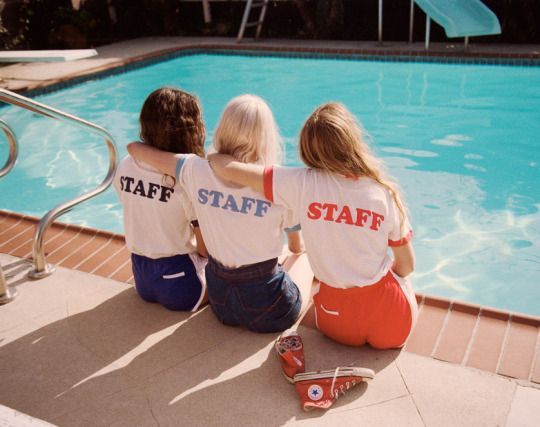
3. what abilities do they have? She’s human but Michelle knows a bit of Karate and was taught how to fight by FP.
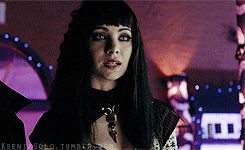
4. what things are they bad at? Being Honest,Indecisive,
5. what is their most impressive talent? Writing and Dancing
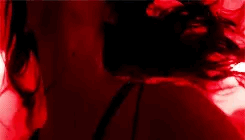
B: Basics 1. what is their hair color? Dark brown. Dies Black or wears Blond wigs.

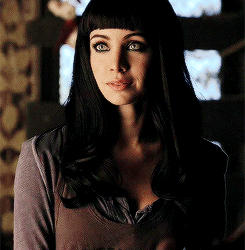

2. what is their eye color? Brown but wears Light green or blue contacts

3. how tall are they? A little shorter than Jughead
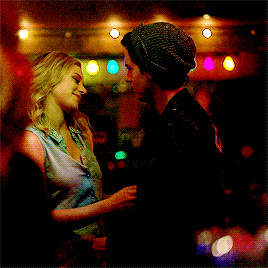
4. how old are they? 15 (Story start) 19 (Story end) October 7 2000
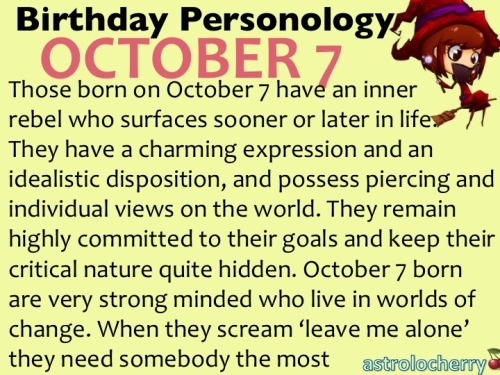
5. how much do they weigh?
C: Comfort 1. how do they sit in a chair? Usually leaning forward.

2. in what position do they sleep?
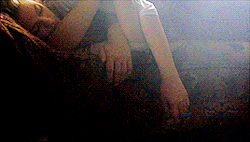
3. what is their ideal comfort day? Reading or watching TV,eating,doing something creative,learning new things (especially about the occult or conspiracy theories),writing poetry,mainly being by herself on her down time.Although she’s an ambivert so she does like hanging out with her BF or Friends after her alone time.

4. what is their major comfort food? um Anything lol She’s literally a female Jughead in more ways than one. Burgers and fries,Milkshakes,Pancakes,Chips and salsa...
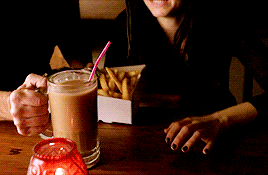
5. who is the best at comforting them when down? Betty or Mom. Most of the time Jughead. (unless it’s about him)
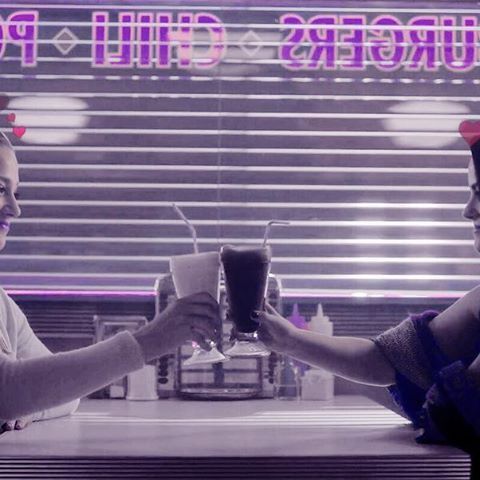

D: Decoration 1. how would they decorate a house if they had one under their name? Minimalistic with plants,charming and attractive yet simple and comfortable. Small neighborhood.

2. how would they decorate their child’s room? Michelle doesn’t want kids
3. how do they decorate their own room? Shabby Chic,Girly mixed with rustic. With of course darker undertones.


4. what type of clothes and accessories do they wear? Goth,Grunge,Edgy,had a preppy phase. (Casual Artsy in Middle school)

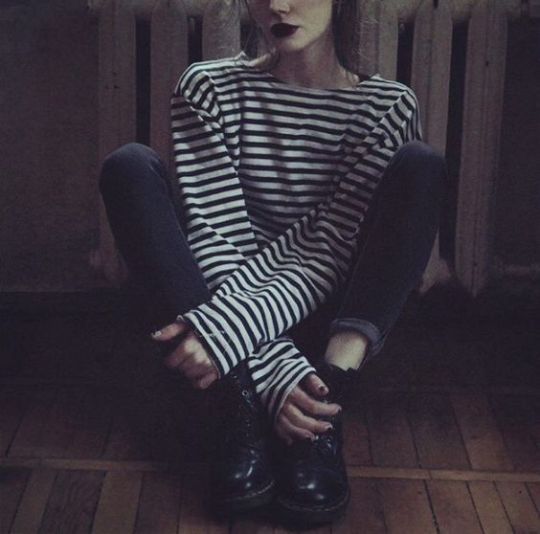
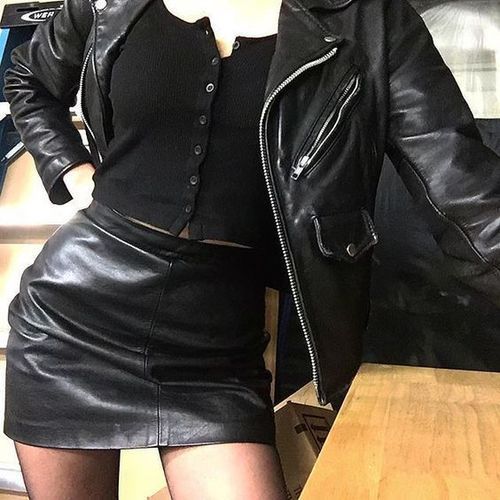
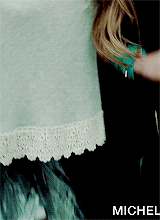
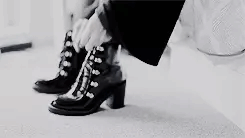
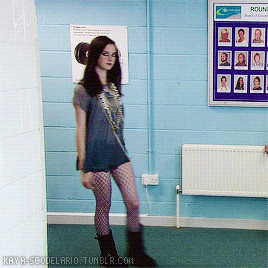
5. do they like makeup/nail/beauty trends? Yes.

E: External Personality 1. does the way they do things portray their internal personality? Sometimes. She’s not as tough as she portrays.
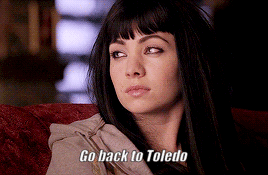
2. do they do things that conform to the norm? Sometimes. If on her own.
3. do they follow trends or do their own thing? No
4. are they up-to-date on the internet fads? Only E-Girl and Mod Goth.
5. do they portray their personality intentionally or let people figure it out on their own? Is shy at first.
F: Fun 1. what do they do for fun? Shopping,Dancing,hanging out at Pop Tates Malt Shop,Drive in movies,Art,watching Horror movies,writing poetry,Solving Mysteries,going out to a club or the biker bar The White Wyrm.

2. what is their ideal party? See Above. Dancing,Strobe lights,Band,Underage Drinking/Sex. Unless she’s 18 or 19 then. Decorating for parties and liked having Clue inspired Sleepovers in middle school.
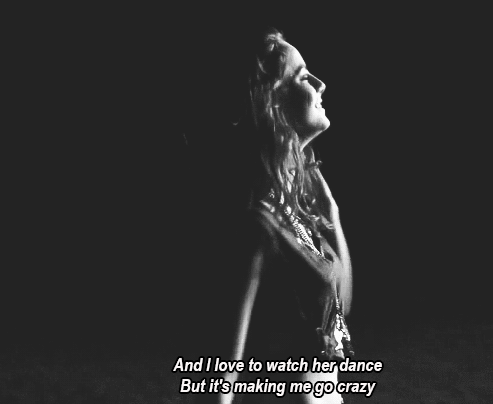
3. who would they have the most fun with? Her girls. B,V & C.
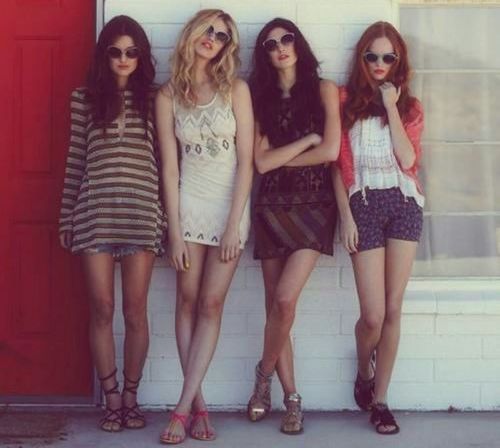
4. can they have fun while conforming to rules? When alone yes.
5. do they go out a lot? Yes.
G: Gorgeous 1. what is their most attractive external feature? Her eyes and smile.

2. what is the most attractive part of their personality?
3. what benefits come with being their friend?
4. what parts of them do they like and dislike?
5. what parts of others do they envy? IDK if I’m going to finish this.
H: Heat 1. do they rather a hot or cold room?
2. do they prefer summer or winter? Spring and Fall
3. do they like the snow? Not really.
4. do they have a favorite summer activity? Thrift Shopping and Sleuthing
5. do they have a favorite winter activity? Reading inside or Sleuthing.
I: In-the-closet
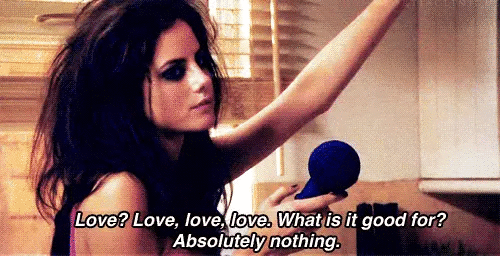
1. what is their sexuality? Pan Sexual
2. have they ever questioned their sexuality? yes
3. have they ever questioned their gender? No
4. would/was their family be okay with them being LGBT? Yes they are very open minded.
5. how long would/did it take for them to come out? High School
J: Joy 1. what makes them happy? Art,writing,shopping,mysteries,love,music.
2. who makes them happy? Her Family (Blood and none)
3. are there any songs that bring them joy? Wow I have a whole playlist...
4. are they happy often? More or less
5. what brings them the most joy in the world?
K: Kill 1. have they ever thought about suicide? I don’t write that. They may have dark thoughts but never act on them,this is not 13 reasons why.
2. have they ever thought about homicide? No
3. if they could kill anyone without punishment, would they? who? No
4. who would miss them if they died? Um all her Friends and Family
5. who would be happy they died, anyone? Penny Peabody lbr
L: Lemons 1. what is their favorite fruit? 2. what is their least favorite fruit?
3. are there any foods they hate?
4. do they have any food intolerances?
5. what is their favorite food? Already said. She also really likes Chicken with chips and salsa.
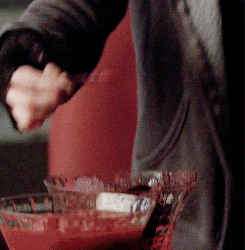
M: Maternal
1. would they want a daughter or a son?
2. how many children do they want?
3. would they be a good parent?
4. what would they name a son?
what would they name a daughter?
5. would they adopt? Possibly
N: Never Have I Ever
1. what would they never do? Kill Innocents.
2. what have they never done that they want to do?
3. is there anything they absolutely can’t believe people do? People do alot of shitty things. Killing Kids and animals would be one of them.
4. what is the most embarrassing thing they’ve done?
5. have they done anything they thought they’d never do? Um get drunk and sleep with her boyfriends Dad??...Or cheat on Jug with Veronica. SPOILERS! But I probably won’t finish this story lbh.
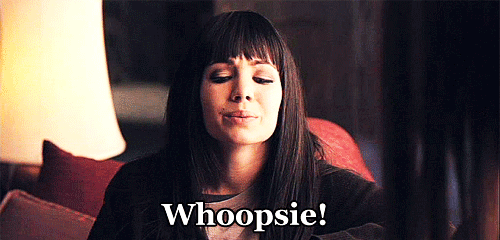
O: Optimism 1. are they optimistic or pessimistic? Both
2. are they openly optimistic?
3. are they good at giving advice? Yes
4. is there anyone in their life that throws optimism on them? Throws lol I suppose her Mom or Betty.
5. were they always optimistic?
>>>P: Personality 1. what is their best personality trait?
2. what is their worst personality trait?
3. what of their personality do others love?
4. what of their personality do others envy?
5. do they hate anything about their personality/about other’s personalities?
<<<Will do this later
Q: Questions 1. do they ask for help? Sometimes
2. do they ask questions in class? She did yes,when she was trying to be a straight A student.
3. do they answer questions that make them a little uncomfortable? Yes
4. do they ask weird questions? Yes
5. are they curious? Yes
R: Rules 1. do they follow rules? Sometimes.
2. would they be a strict or laid-back parent? A good balance.
3. have they ever been consequences for breaking a rule?
4. have they broken any rules they now regret breaking?
5. do they find any rules they/others follow absolutely ridiculous? Nope
S: Streets 1. are they street-smart? Yes
2. would they give money to someone on the streets? Probably
3. have they ever gotten in a fight on the streets? Yes
4. has anything happened to them on the streets? Other then Fights,no.
5. are they cautious when out? Now yes,but she can take care of herself.
T: Truth 1. are they honest? More so now yes.
2. can they tell if someone is lying? Yes
3. is it obvious when they’re lying? Yes
4. have they lied about anything they regret lying about? Sleeping with FP
5. have they ever been talked about behind their back? I’m sure.
U: Underdog 1. have they been bullied? A couple times but they stopped once she stood her ground,same with standing up for others (like Jughead)
2. have they bullied anyone? No
3. have they been physically attacked? Yes
4. have they ever been doubted? Yes.
5. have they surprised people with being good at something? Yes,alot of Guys (and girls) underestimate her.
V: Vomit 1. do they vomit often? 2. do they get lots of stomach aches? 3. are they good at comforting someone ill? 4. what do they like as far as comfort goes? 5. do they burp, cough, or hiccup most when nauseous? when vomiting?
W: Water 1. do they drink enough water? 2. have they learned to swim? 3. do they like to swim? 4. can they dive? 5. can they swim without holding their nose?
X: Xylophone 1. what is their favorite genre of music? Oldies,Indie & Goth Rock
2. do they have a favorite song? Prince-Die 4 U
3. do they have a favorite band/artist/singer? The Cure,Prince & The Neighborhood.
4. can they sing well? Sure
5. can they rap? No
Y: You 1. how old were you when you created them? It was in 2017.
2. what inspired you to create them? Watching Riverdale for the first time
3. were they different when they were first created? No
4. do you enjoy writing them more than other characters? No
5. what’s your favorite thing about them? Her style and sarcasm.
Z: Zebra 1. what’s their favorite animal? Cats and Dogs
2. do they like animals? Yes
3. cats or dogs? Both
4. what’s their dream pet? Panther or Dragon
5. do they have any pets at the moment? Shares a Sheepdog/Mutt with The Serpents,named Hot Dog.
4 notes
·
View notes
Text
All She Really Needs
Characters: Michael Middleton x Charity Middleton (Ride or Die: A Bad Boy Romance)
Rating - Teen+, mention of death and cancer and trauma
Note - This has no prompt or anything tbh, this was just something I started writing, and obviously it turned into a story.
Tag list - @drakewalkerfantasy @ao719 @princess-geek @polishchoicesfan @binny1985 @desireepow-1986 @adriansbiss @i-bloody-love-drake-walker @hatescapsicum @itscassandral @gardeningourmet @heauxplesslydevoted @thequeenofcronuts @kaavyaethanramsey @choicesolivia @regencylady1810 @dailydoseofchoices @storyofmychoices @choicesficwriterscreations
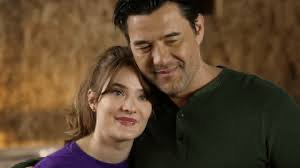
Summary - Just a little fic explaining Charity I guess. SUPER SAD, PLEASE GET TISSUES AND DO NOT READ IF THE MENTION OF DEATH AND CANCER IS TOO MUCH ⚠️⚠️⚠️⚠️⚠️⚠️⚠️
Word Count - 1154
———————
There was a girl, Charity and there were girls like Ingrid, there were girls like Emma Harrison. Girls like Ingrid were all about being the best in the social circle of Mar Vista prep school, they aspired to be queen b and did not allow anyone to stand in their way. Girls like Charity Middleton were quiet, docile but passionate. They focused on their studies and their families and were a teacher dream. Even though Charity and Ingrid had remarkably similar grades and were expected to be in running for Valedictorian at the end of their senior year, they were as opposite as they come.
Girls like Ingrid were all about being seen with the quarterback of the school football team. They had to high the most expensive shoes and the most expensive bags, and the frilliest, most on trend designer dress and had to be able to hold their own in a bitching fight. They had to be important, in other words. Girls like Ingrid would parade around the school, bullying the nerdy kids or ignoring the new kid, they had a reputation to keep. Deep down, girls like Ingrid may have had an extremely hard upbringing and were that way because of the unfortunate upbringing they had.
Then there was the other category of girls, Emma Harrison type girls. To be honest, there not too much difference between the Ingrid and Emma type, only the fact that the Emma type of girls lived on drama. To the point it was unhealthy, they would cause drama for other students and then when they were confronted by teachers, they threatened to call their parents to come and speak to the teachers. The Emma type girl was someone whose father was ridiculously rich, had his own business, occasionally a luxurious holiday home in a location such as Barbados or Dubai. These types of girls were spoilt brats, they always wanted, and they never even tried to give back to the people who they took from.
Then there is Charity Middleton, a sweet, quiet girl. She was the daughter of a hero cop, Detective Michael Middleton and recently deceased paediatric surgeon, Clara Middleton (maiden name – Schutz). Charity was unique in school, se never had gotten into trouble with any teachers, she had the perfect attendance record pretty much, unless she was severely ill, then her mother and father would insist she was off school. She was the type of girl who would rather (when her mother was alive) go to the hospital to help at the gift shop or the charity shop they had there. She wanted to help people and she was smart, but she never used her smartness as a weapon. She was docile as they come, only speaking up in class if it were to do with their work. She had 5 friends, but for her that is all she would ever need. She stayed clear of drama, and she only focused on things that would directly impact her, she never caused drama. When all the Ingrid’s and Emma’s were out at a alcohol fuelled party, with sex and god knows how many types of drugs, she’d either be at home under a blanket watching some medical or crime drama or some boxset she and her dad would have seen a thousand times, but somehow each time they saw it, it was better than the last. When hr dad was on night shift, her best friend Riya and her would browse through Netflix for a scary movie to watch, it was perfect, it was just the way she wanted to be.
The sad thing about Charity Middleton was she lost her mother at 13, in a completely unpredictable turn of events. Clara was at work one day when she collapsed, and her husband and daughter’s life was changed. Clara was diagnosed with cancer, and very quickly told it was far too advanced to be able to do anything, she was given a year to live. Michael’s world crashed down around him, and their sweet, beautiful daughter was just as affected by it. In the months leading up to her death, Clara had to give up work and day by day got weaker. She became a different person, she as emotional and broken and weak, but try to put on a brave face for her 12-year-old daughter. But as Charity’s 13th birthday hit, Clara was given weeks to live, she became worse and she was slowly slipping the way. She insisted they celebrated Charity’s birthday as they planned and travelled to London, against the orders of her medical team. A week went by in London and the family had the most magical time, it was 2 days after their return, Clara was put into a hospice, and was told she had at least a week to live, it came to 10pm that night, when Clara gave up her fight, and passed away in her husbands arm, with her daughter in her arms.
As sad as losing her mother was, it did not change the girl Charity was, not really. It made her stronger and it made her appreciate her father even more. All they had was each other and they were determined to never ever take each other for granted. They made a promise to themselves, each other and to Clara to never let anything stand in their way of being father and daughter, from being a team. Charity grieved and still grieves to this day as her mum was everything to her, and still cannot even try to comprehend why what happened to her mother happened. What did Clara do to deserve all that pain?
No matter how much she hurts and no matter how much she wants to shut the world out, she does not, she continues her life the way Clara wanted her to and she goes out of her way everyday to be there for her dad as he is there for her. As much trauma as they face on the way, from grief to anything else, the thing is Charity knows how loved and cherished she is, and Michael knows how loved he is by his daughter.
The one thing her mother taught her was to never stop being who she was, to be herself and all will be well. Her mother taught hr to accept who she is and to never change who she was, for anyone. Her father loved her for who she was, and to her, her dads love was all that mattered. She just needed her dad, her first love. So as much as she wanted to have more friends, she knew she never had to change who she was, because the most important man in her life at age 15 (her father) loved her the way she was and would never stop loving and believing in her. And that is all she needed.
#choices stories you play#pixelberry#choices#fanfiction#choices fanfiction#choices fanfic#rod choices#rod dad#rod mc#choices ride or die a bad boy romance#choices ride or die#ride or die mr wheeler#ride or die main character#charity middleton#michael middleton#dad and daughter#rod dad and daughter
6 notes
·
View notes
Text
All I see is green (2/?)
Ship: Harley Keener/Peter Parker
Summary: Peter Parker feels on top of the world! Getting high grades at high school, spending time with Tony Stark (!!!) on his weekends, and at night, he roams the city as the hero known as Spider-Man! Everything changes when a new student shows up at Midtown who seems determined to take it all away from him.
AO3 | FF.net
Harley shoved his hands in between his tightly pressed together knees in order to hide their shaking and kept his eyes fixated on an oddly coloured stain on the carpet of which he did not dare to assume the origin. Meanwhile, Principal Morita was talking endlessly, obviously excited by the prospect of being in some way affiliated with the great Tony Stark.
Don’t get him wrong, Harley loved Tony, more than anyone else (except for maybe Rhodey and Pepper), and over the years he had known him, the man had grown to be like a father to him, but Tony had always been so secretive. He would show up unannounced at Harley’s house every once in a few months, and would spend a weekend there, talking and tinkering and just generally having a good time. Tony was a sarcastic asshole, but Harley rivalled him in the category and the banter they kept up together flowed flawlessly. And then he would disappear, as if he was never there, and Harley wouldn’t hear from him until the next time he would show up. It was an odd dynamic, and Harley couldn’t help but feel like Tony’s embarrassed of him somehow. It wasn’t surprising, of course, Harley was barely visible next to the titan that is Tony Stark, but he’d be lying if he said it didn’t hurt at all. This dance continued for years until he appeared. Jason…
Of course, Harley had wanted his mother to be happy, and Jason had been nice enough at first. But by the time his true nature started rearing its ugly head, his mother was deeply invested, head over heels in love with his manipulative sweetness. It still surprised him every time the hits came, though. That is, until Tony showed up unannounced at the worst (best?) possible moment and now Harley was sat across an enthusiastic principal of a fancy smart-kid school in New York.
“…I asked another student to be your buddy today. He should be here in a few minutes- Ah! There he is! Good morning, Mr. Parker, thank you for coming in early today.” Harley looked up at Principal Morita’s words, and saw a boy with a baggy jumper quietly close the door behind him, and tentatively sit down in the chair next to his. Harley smiled at him, and the boy smiled back.
“This is Harley Keener,” Principal Morita spoke up again, this time to the other boy, Parker. “He has recently moved to New York from Tennessee and wants to share his talents and knowledge with us here at Midtown.” Harley felt embarrassment and a hint of anger rise within him as lowered his head and scratched the back of his neck. God knows this man wouldn’t have been praising him if he knew he was just a simple boy from Tennessee who just happened to almost shoot Tony Stark with a potato gun.
“I’m just here to learn, Principal Morita,” he muttered dejectedly.
“Nonsense,” the man boomed, slamming his hand into the table in his enthusiasm, startling both teens, “You came in mid-term with personal recommendations by Tony Stark himself!” From the corner of his eye, Harley noticed Parker’s head shoot up at the mention of Tony’s name.
“Tony… Stark,” he stammered, and Harley rolled his eyes. Was this the first step to being bombarded with questions about Tony for the rest of his school career?
“This is precisely why I wanted you to be Harley’s buddy during his first week here at Midtown,” Principal Morita continued. “Since you are Mr. Stark’s personal intern and all…” This caused Harley to look up and slowly turn his head to face the brown-haired boy beside him. He felt a sudden surge of anger and protectiveness as he thought back to Tony’s compound, achingly empty with the ghosts of his former colleagues ubiquitous. The man who saved him does nothing but work in order to make everybody else’s lives easier, and here was a little high school boy who pretended to know and work for Tony in order to get into better colleges, or whatever.
“You’re not Tony’s intern,” he snapped, and boy looked taken aback, almost offended in his surprise.
“I- I am, I’m- I-.” Harley’s glare intensified and he leaned forward towards Parker.
“You’re what?”
“Now, now, play nice, boys,” Principal Morita interrupted, his voice significantly more serious than before, having obviously caught on to the confrontation. “You have both brought in statements signed by Mr. Stark stating that you are his personal intern. Maybe he simply has not yet got to introduce you to each other yet.” Impossible. Harley couldn’t think about Tony unashamedly taking this high-school aged boy into his workshop and tinkering, and bantering, introducing him to his friends and his fiancé, whilst Harley was being beating to a pulp behind the garage he had first met the man. Simply impossible.
“Here’s your schedule and your locker number and combination,” Principal Morita sighed, handing Harley an envelope. “I hope you have a wonderful first day at Midtown High.”
“Thank you, Principal Morita,” Harley nodded politely, and stood up, making his way out of the office without even glancing back at Parker. He almost started running, the moment he was out of sight, desperate to stay as far away from the boy as he possibly could. He didn’t want to believe Parker was telling the truth. He didn’t want to deal with the implications. He didn’t want to risk feeling hurt, confronting Tony, only to hear that he was indeed embarrassed of Harley. That he was a burden, and Tony felt obligated to hang out with him. That he’d rather Harley packed his bags and moved back home.
Deep down, where his voice of reason currently resided, Harley knew that Tony wasn’t like that. If anything, the man was just emotionally stunted, caused by layers upon layers of cruel betrayal, but Harley knew only betrayal from his father figures before Tony, so why would this be any different? Footsteps behind him told him that the boy had finally caught up with him.
“S-so, what’s your first class?” The kid asked, his voice trembling, most likely from straining to keep up with him. Harley ignored him, and picked up his pace, expecting to easily outpace the skinny looking boy. Before he knew what was happening, though, the other teen had rushed past him and blocked his way abruptly, leaving Harley unable to stop in time and running into him.
“Come on, I’m just trying to help you here. Mr. Stark-“ At the mention of Mr. Stark’s name, Harley felt the anger (and hurt) inside him grow burning hot and he raised his finger, shoving it into the boy’s face.
“Listen up, punk,” he snarled. “Tony Stark may be your little nerdy wet dream but he is an actual person. You can’t just go around making up some shit about a fake internship, that I know for a fact is absolute bullshit; Tony doesn’t hire interns, nearly nobody is even allowed to enter his lab, just so you can go around and skip class without getting in trouble. You’re a fucking fraud, who falsified some documents to make it look like he is interning with Tony Stark.” Harley was yelling at this point, his face felt hot as he prodded his finger into the kid’s chest. Parker raised his hands as if to pacify Harley, but it only made him angrier. Neither of them even noticed the growing crowd of students that was forming around the confrontation.
“You are not Tony Stark’s intern, you’re not in any way affiliated with Stark Industries. You’re a liar and a fraud and I am going to expose you for it.” With those words, Harley pushed past Parker and rushed further down the hall, before faltering around the corner, realising he wouldn’t know where to go without a guide.
With the anger almost instantly rushing out of his body, Harley felt embarrassed. He had thrown a complete temper tantrum and said awful things to a boy who, now that he thinks of it, had only ever tried to be helpful and kind. Even if he was lying about his internship with Tony Stark, did he really deserve to be treated like that? Pushing through his rising guilt, Harley looked at the envelop in his hand, and finally opened it to take out his schedule. He stared. And blinked. And stared again. The amount of unrecognisable numbers and letters was daunting and added to his current emotional state of mind, he could not make sense of the jumble on the paper before him.
“Hey, I just wanted to see thank you for calling Parker back there out on his lies.” Harley looked up and saw a boy with dark eyes and a smug grin leaning against a wall near him. “I’ve been trying to tell my peers that he is a lying scumbag, but nobody would believe me, because he looks so innocent, you know?” So, Parker definitely was lying about his internship, then, Harley concluded to himself. And it even sounded like he had been giving the boy in front of him a rough time. He latched onto these comments to push down the guilt that aggressively tried to drown him, and smiled back at the boy.
“He had it coming,” he responded. “I can’t stand people who lie and bully.” The boy grinned back at him, and then let his gaze slide down towards where Harley was still clutching the senseless piece of paper that was supposed to tell him where to go.
“You’re new? Can I look at your schedule?” Harley nodded gratefully and handed over the paper. The boy looked at it for a brief moment, and his grin was back with full force as he turned to Harley.
“Would you look at that,” he said cheerfully, “our schedules are exactly the same! If you’d like, I can show you around today. My name’s Flash.” Harley looked at the kid holding out his hand to shake and didn’t hesitate to shake it, as he introduced himself. “I’m Harley.”
Flash was… interesting, to say the least. He was kind enough to Harley, always happy to help him out, and wasn’t grilling him for information about Tony Stark. But the way he treated people around him seemed off. He would sometimes yell at his friends out of nowhere, or aggressively bump into people in the hallway. If he caught Harley looking, he would flash that familiar grin and shrug, as if it wasn’t a big deal, but it was hard to ignore. However, when Flash tripped Parker over as he was walking down the hallway and the boy fell to his knees in front of them, Harley couldn’t help the sadistic heckle that escaped him. Parker’s brown eyes looked at him, and hurt was plainly visible on his face, but he was up and gone before Harley could think about it.
By the time his final period of the day, English class, came around, he felt as if he had run a marathon. He was exhausted to his bones, and he felt his eyes drooping as the woman at the front of the classroom droned on endlessly. A sharp jab to his side woke him up abruptly, and he tuned in, just as his teacher sternly addressed Parker, who was sat at the front of the classroom.
“Mr. Parker, am I so boring that must resort to playing video games on your phone during my class?”
“I- I’m sorry, Mrs. Winterhalter, I’ll pay attention.” Flash started laughing quietly at Parker’s expense and Harley couldn’t help but join in, in a sick way enjoying the way it made him feel to laugh at somebody else’s misery. Mrs. Winterhalter squinted her eyes sternly at them and they quieted down, trying to keep straight faces.
“See to it, Mr. Parker,” she added, and went back where she had left off before. Harley felt his phone buzz in his pocket, and took it out stealthily to check. It was a text from Tony.
TONY STARK
I’m outside, kid
He felt his heart jump up at the prospect of seeing his friend-turned-father figure again, after the confusing day he had had. Just as he put his phone away to turn back to the lesson, the bell rang to signify the end of the period and students started rushing out of the classroom. Harley also frantically started packing his belongings, and made for the door, followed on his heel by Flash.
“Hey, Harles, are you in a hurry?” He slowed down his pace.
“My… uh… my dad is waiting outside.”
“Oh, cool, I bet you’re stoked to go home after such a long day.” Harley let out a relieved laugh at Flash’s understanding, and wrapped an arm around his shoulders just as they stepped outside.
“Quite stoked, yeah,” he laughed. Flash was just about to reply, when he was interrupted by a voice in the distance yelling: “Hurry up, Harley!”
“That’s my dad,” Harley hastily explained, scared that Flash would see the figure by the car and realise that he’s claiming that Tony Stark is his father. “I have to go now. Thank you for everything.”
“No problem, dude,” Flash responded with surprising kindness. “I’ll see you tomorrow.” Harley waved goodbye and started running towards Tony, who was still looking around.
“Hey, old man, I’m right here.” Tony grinned at him.
“You better watch what you’re saying, boy,” he warned without a trace of seriousness. “Do not go around calling me old. How was your day at school? Where’s Peter?”
“It was fine, I- Who’s Peter?” Tony looked at him with a confused frown.
“Peter? Peter Parker? Damnit, don’t tell me the principal screw this up! Morita told me he’d have Peter be your buddy so you could meet him! I figured you two would be best friends by the time you stepped out of this building. You are so alike!” Harley could see the dawning horror on his own face in the reflection of the tinted windows behind Tony.
“Oh, fuck…”
#peter parker x harley keener#peter parker/harley keener#peter parker#harley keener#fanfic#pls share and review
17 notes
·
View notes
Text
Archetype’s Great Choose Your Own Villain Adventure
You’ve finally done it — you have written an amazing hero.
She has all of your own best traits: kindness, bravery, stubbornness, cute glasses. You don’t know if you want to be her or marry her. Readers will see themselves in her and dress to match her style. Critics will fear her. And best of all, she is wholly, undeniably, ready carrying the weight of your complex plot.
But now you need to craft your antagonist. And this fellow really needs to measure up.
Don’t worry, though—in this post, we’ll break down some of the many tools you can turn to when creating someone to foil your protagonist’s plans.
Just how bad is bad?
A. An Evil Villain?
This villain has no morals, or if she does, she buried them deep down a long time ago. She’ll sacrifice her family, friends, and everyone’s free will for eternal beauty, unlimited power, or world domination. Think the Evil Queen from Snow White or Sauron from Lord of the Rings.
B. A Disgruntled Opponent?
This villain's had a lifelong streak of bad luck. His parents were killed by someone eerily similar to the hero, global warming flooded his lair last week, and the hero spilled coffee on his pants while saving a cat from a tree this morning. Really, all he wants is a nap—if he has to chain up a few good guys for some peace and quiet, it’s no more than he deserves. Think Luke Castellan from the Percy Jackson series.
C. A Good Person with Questionable Goals?
Rational people presented with the same situation won’t always agree, because at the end of the day all people, even equally good people, have different values and morals. If your hero wants to flip the switch and save five people on the train track but your antagonist doesn’t think the one man on the other side should die, you’re probably going for this dynamic. This is Captain America: Civil War through and through.
Just how serious are they?
A. Funny and exaggerated?
A villain like this is there to put a wrench in your hero’s plans (and probably provide lots of comic relief), but not seriously threaten anyone with bodily harm. They may think they’re irredeemable and say they couldn’t care less about another person, but they’re either confused or wildly incompetent. Think about it: nobody believes Dr. Doofenshmirtz is going to do anything more than mildly inconvenience them.
B. Menacing and exaggerated?
Your villain shoots lasers out of their eyes. Their knuckles are embedded with knives. One whiff of their breath causes paralysis. One word from their mouth has civilians leaping off cliffs. They wear only black, and their evil lair says “Evil Lair” on the front door. They also probably have a lot of henchpeople. Basically, everything about them screams Bad Guy, to the point where it’s definitely not realistic. A good example is Gru from Despicable Me.
C. Spookily realistic to the point of goosebumps?
The world is a scary place, and sometimes it’s important to represent that in your work. Antagonists can be made all the worse by the fact that they’re just regular people doing reprehensible, unforgivable things. Think Frollo in Hunchback of Notre Dame or Mother Gothel in Tangled—attempted sexual assault and child abuse are no joke.
Was your antagonist …
A. Brought into being because of the actions of your hero?
Some villains might have been a cashier down at the 7-Eleven if it wasn’t for that chance encounter with your hero all those years ago. Now, though, they’ve sworn to get revenge for their slighted pride—stupid heroes and their ego, right? Buddy Pine, AKA Syndrome from The Incredibles, is a great example of this.
B. Morally transformed by a dramatic life event?
Sometimes good people do bad things when they’re under a lot of stress, especially if they’ve been traumatized. Have they been forced to make an impossible choice with consequences that haunt them? Tortured because they were good? Watched their family die? Depending on who you ask, the Punisher falls into this category.
C. Doing the wrong thing for the right reasons?
Sure, your antagonist stole the diamonds and fired a warning shot at the reception outside the gala, but the real baddie is holding her wife hostage at home. Your hero would have done the same thing—right? Think the origin story of the Hook-Handed Man from A Series of Unfortunate Events, or Killmonger from Black Panther.
On a related note, does your antagonist …
A. Have a history with your hero?
In many cases, the protagonist and the antagonist go way back. Maybe they were once friends (this has tons of potential—do they know each other’s weaknesses? Have certain pet peeves they’ve sworn never to exploit?), or maybe they’ve just fought about this issue many times before. Have they dated? Were their parents friends? Think Catra from Netflix’s She-Ra reboot.
B. Fear your hero’s reputation?
This antagonist knows your hero is coming, and as much as he tries to deny it, he knows he’s not ready. Maybe there’s a prophecy. Maybe the hero just has a really good PR team. Either way, the villain is going to try to shoot first—and if he misses, he probably won’t get another chance. Voldemort.
C. Have no interest in your hero whatsoever — the hero wants to stop them, but they don’t think the hero is a threat.
There’s always a chance, though, that your villain doesn’t even think your hero is worth the time of day. Maybe they’ve heard of him, maybe they haven’t—what does it matter when they’re not going to be stopped either way? This villain feels toward your hero what Irene Adler feels toward Sherlock Holmes—totally unbothered, and maybe occasionally amused.
Other fun questions to ask:
Do they have a sidekick? Why does that sidekick serve them?
Do they have an accent? Is it real or for effect?
Do they have powers? Do they wish they did?
Do they have a color scheme?
Does something dramatic happen every time they come into the room (lightning strikes, mirrors crack, a woman screams, etc.)
If left in the room with a wailing baby, how would they handle it?
If left in the room with a barking dog, would they handle that differently?
What are they afraid of?
Things to be cautious of:
Excusing appalling behavior via redemption.
Some things are just inexcusable—or at least, they should be, if we don’t want to contribute to the negative energy out there in the world. So ask yourself … has your antagonist beaten their wife? Sexually abused someone? Harmed children? Acted extremely racist? Gleefully supported fascism? Brutally killed their own father in cold blood?
If you answered yes to any of these questions, think really carefully before planning a redemption arc.
If you want your villain to turn to the good side by the end, they can still do villainous things. They can lie, they can betray those who are close to them, they can plot world domination, they can even kill. But there are lines you probably can’t let them cross if you don’t want them to be hated by your other characters for all eternity. Let’s put it this way—Aladdin, whose worst crime is stealing bread, is redeemable. Loki, who was supposedly being mind-controlled during the first Avengers film, is questionable. Hannibal Lecter, who eats people, is a lost cause.
A really, really phenomenal example of a villain doing sometimes-okay things and yet not being excused for his misdeeds is Count Olaf from A Series of Unfortunate Events—both the books and the Netflix series. There are genuine, emotional reasons he’s a terrible person, and he even does halfway decent things every once in a while. And yet, he’s not forgiven by the characters or the narrative, and he’s treated as the villain he is until the bitter end. Actually, A Series of Unfortunate Events is great at this all around:
Charles: You have to understand, he had a very terrible childhood.
Klaus: I understand. I’m having a very terrible childhood right now.
A less great example is Severus Snape from Harry Potter. When it’s revealed that he loved Lily and occasionally didn’t have it out for Harry by the very end of Deathly Hallows, it’s like the narrative wants us to forget about his bullying, bigotry, attempted genocide, child abuse, pet-murdering, deception, and every other foul thing he gets up to for thousands of pages.
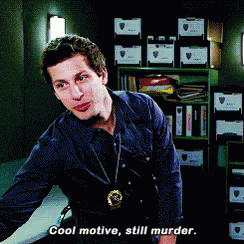
Queer coding. There’s this thing Disney does that you might be familiar with. Let’s pick a few examples and see if you can pinpoint it.
Simba vs. Scar
Hercules vs. Hades
John Smith vs. Governor Ratcliffe
Ariel vs. Ursula
That’s right—male villains tend to be more effeminate and delicate than their tough heroic counterparts, and female villains are hell-bent on corrupting sweet, innocent princesses. Even if the characters themselves aren’t meant to be read as gay—even if they don’t appear gay at all, aside from the coded traits—there’s a history of this being used to reinforce negative stereotypes.
That’s not to say that you can’t have gay villains—make everyone LGBT+, if you want. Goodness knows there are enough straight characters out there to last several lifetimes. But if only the villains are gay, and all the heroes are straight, you’re getting into the dangerous territory of suggesting that the traits that villains have are traits that only gay people have, and vice versa.
The same thing applies to race—if all your antagonists are black or Asian or Jewish or Romani and all your heroes are white, what does that say about how your readers should view good and evil? And if all your villains are disabled or mentally ill and your heroes are able-bodied, might you end up spreading the wrong message?
Writing diverse stories is amazing and so, so worth it! But it’s definitely going to take extra sensitivity and care—so make sure you’re fully committed, or you risk doing more harm than good in the end.
Questions? Concerns? Send us your thoughts at [email protected] or leave us a comment!
#archetypeonline#genre fiction#blog post#antagonists#short stories#young writers#science fiction#fantasy#bad guys#character development
6 notes
·
View notes
Text
Yuri on Ice Rewatch and Live-Commentary, Episode 1: Easy as Pirozhki!! The Grand Prix Final of Tears
*There are spoilers throughout. I also make assumptions that anyone reading has already seen the episode or has a grasp of the content.*

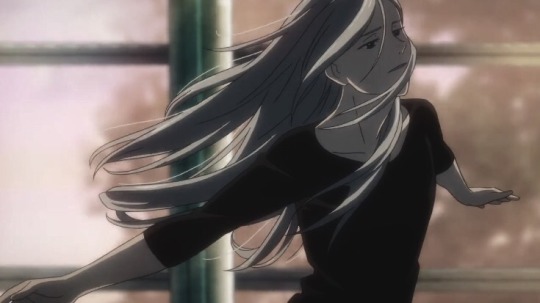
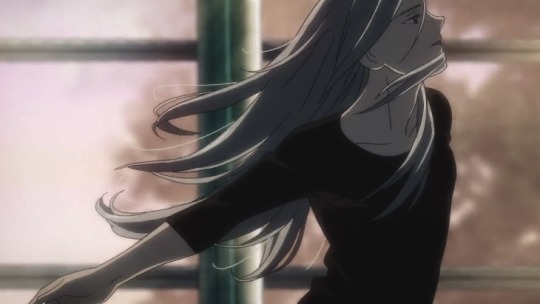
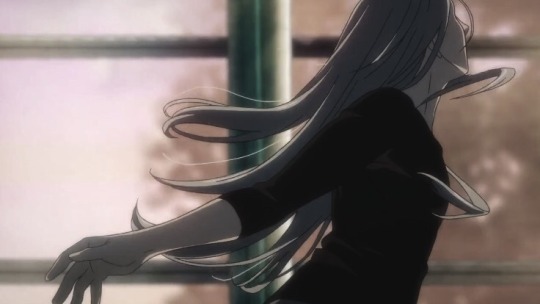

Source: http://yurionicescreencaps.tumblr.com
The opening scene is so pretty. Really sets a tone. I went in knowing nothing about the anime first go-around, so I found Yuri and Victor’s grow/glow-ups montages interesting.
This theme song is… not my favorite. Maybe it’s the French horns? That and too much synth. I usually skip over it but want to give it a chance this go-around.
Heh, Victor and his gold blades to match his gold medal. And his European af haircut. Can’t remember the last time I saw an American past the age of 12 with bangs. No mistaking him for anything other than Eastern European.

Also, the poster on the left is for Victor, I believe. Can he pull his leg that high in the air? Was that featured and I forgot? I’ll be on the lookout for it.
Also, looks like Jean JACK made it to Sochi and placed third here too, lolz.
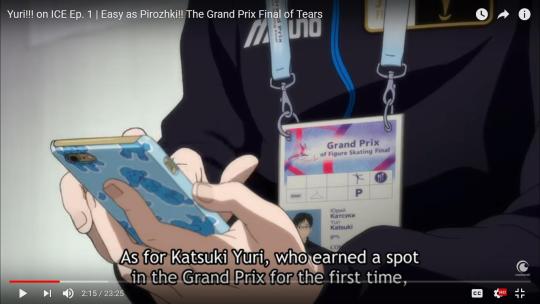
Yes, please listen to your coach, Yuri. Don’t poke the wound. Stay off the internets. ESPECIALLY the figure skating internets. What little I remember from when I used to follow the sport is that it’s dramatic, to put it nicely.
I keep getting distracted by the utter Euro-ness of the Europeans in this show. The cut of Coach Celestino’s suit is so Italian I weep. He’s too smooth.
Yuri’s name tag has his name in Cyrillic as well? Cute.
My first impression of Yuri was that he looks about 18 and that impression hasn’t changed. Perhaps it’s the glasses, but he def looks youthful. I’m also someone who’s been accused of looking a decade+ younger than I actually am, so I can sympathize.
Speaking of sympathy – Yuri caved to pressure, binged ate before the competition while mourning his dog, then bombed his first trip to the Grand Prix final. All in front of his idol. Damnity damn damn. Sorry, kid.

Is Cao Bin ever introduced on the show? Something else I forgot, maybe?
Now, when I first saw this poor child crying in the bathroom, that’s when I knew the series was going to be much different from the light-hearted anime about figure skating I expected. It got real deep real quick.
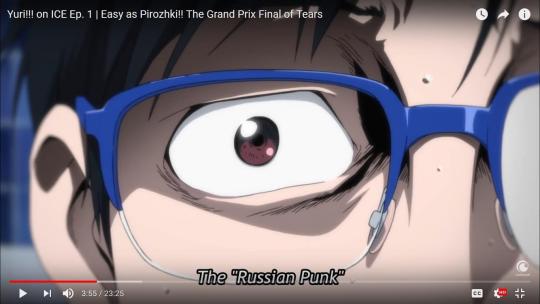
Yuri Plisetsky “The Russian Punk”. Is this something the in-universe media refers to him as? Because I only recall (JPN) Yuri saying it and only this once.
This screencap is during the scene where the journalist Marooka (sp?) is hassling Yuri about his future plans and instead of answering, Yuri can only stare at someone else’s puppy that reminds him of his dead Vicchan.
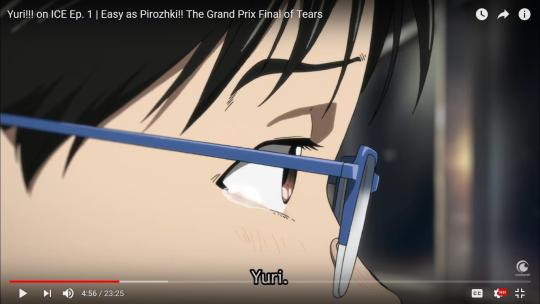
This baby is crying. Cry.ing. This has been a tough day for poor Yuri, overall.
And he talks down to himself so much. It’s all his fault he caved to pressure. He was an idiot to think he could meet his idol on the same playing field. He’s come so far and still thinks so little of his accomplishments.

So, I understand this “one year later” is not really accurate, lol. It’s just the new year following the previous season. I was confused initially about a number of soon-to-happen events before Yuri’s mental alter ego cleared it up.
So, per Minako’s voice actress, Yuri really is pronounced YOO-RI. Cute.
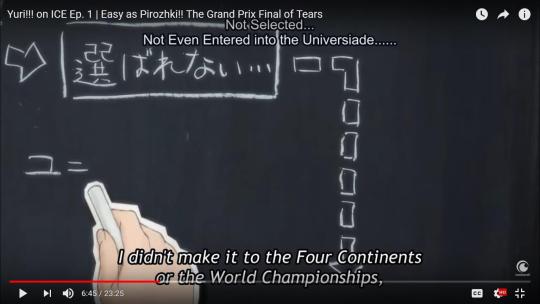
Four Continents is… not a Grand Prix competition? My figure skating knowledge is all rust now.
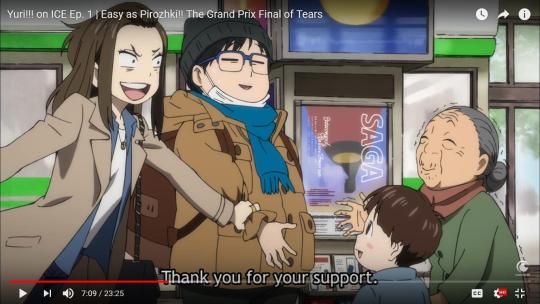
LOL, Minako does. Not. Play. And she wears a pinky ring. My God, that death grip on poor Yuri.
It’s snowing outside the train station when Yuri and Minako leave. So, it’s not unusual to snow in this region in March, but it’s highly unusual a month or so later. Man, hard to believe Yuri sat around for almost an entire month before the infamous video became viral. More on that, later.
So, based on everyone’s interactions with Yuri so far, the only person who cares that he didn’t make it to the World Championships is him. And he should care since he’s worked basically his entire life towards that goal. But, he doesn’t appear to have let anyone down but himself, though he doesn’t act that way.
So, the fact that the family hot springs is named “Yu-topia”… did that influence Yuri’s name at all, I wonder?
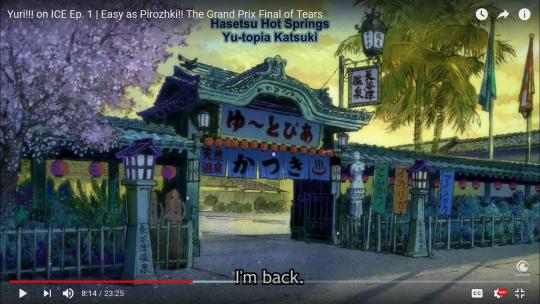
Ha! I wish I could have recorded the Japanese actor’s voice when he says this line. He makes Yuri sound so done with it all, lol. It’s the best.
Ok, so a number of very interesting and entertaining things happen in succession that I don’t feel like screencapping. No hug between the littlest Katsuki and the senior Katsukis, even though he hasn’t been home in 5 years. Fascinating. No doubt cultural (I’m guessing) but fascinating.
Yuri’s mom basically calls Minako a drunk. To her face. LOL. But I imagine no one can get mad at this sweet lady.
Minako calls Yuri out on his weight gain in front of God and everybody. Though, I think it’s more of a matter of his clothes no longer fitting due to said weight gain.
But, his parents don’t care. Eat more pork cutlet bowls, Yuri! Welcome home!
Vicchan’s shrine is where they also store the unused treadmill. Want to bet the only person to use it was Yuri?

Then older sis Mari-neechan appears with frosted tips. I can appreciate a character that doesn’t beat around the bush (a trait she inherited from her mother, I imagine). Welcome home, Yuri, but don’t sit on your ass. Start thinking about your next move.
Actually *loads headcanon* I suspect Mari doesn’t want Yuri to give up on skating. The longer he stays at home, the more quitting becomes a possibility.
So, the Katsuki family hot springs resort (Inn? Restaurant?) is the last one standing in town. Very OT, but I wonder if the hot springs are still an attraction at all and are perhaps, government-owned? Protected, used by tourists for a fee, perhaps? I think about things like that.
Having never visited a hot spring, and based on the setting around Minako while she watches the World Championships on TV, it appears to be a place for people to come, soak, and lounge and grab a bite to eat if the mood strikes. So, the Katsukis wait on people basically all day long. Gotta be exhausting work.
Yuuuuuko! The Madonna of Ice Castle Hasetsu! Yuri’s crush on her is hella cute.
A slight segue to Yuri’s perceived attraction to Yuko and what it could imply about his sexual identity. Per his labeling of Yuko as a “Madonna,” I figure Yuri considers Yuko untouchable, perhaps even “too good” for him. Yuko, just like Victor, is “ideal”. For someone as self-conscious as Yuri, comparing any romantic prospects against his two ideals was probably a convenient excuse not to get *too* close to anyone, male or female. That being said, he didn’t pursue Yuko. Alcohol loosened enough of Yuri’s inhibitions to eventually openly flirt with Victor, but this is still an important distinction, IMO. He pursued one of his ideals (in more ways than one, even going so far as to leave home to in hopes of becoming Victor’s equal) and left the other one behind.
Yuri idealizes/d Yuko, and comes to love Victor. He’s gay. Bi, at the least.
I don’t feel confident in applying any other labels, because I’m a straight. Yuri could fall under any number of categories as long it they include, IMO, same-sex attraction.
In actuality, Yuko is “introduced” to the audience as Yuri’s straight love interest, but that doesn’t last long. Cute and clever, show creators. Cute. And . Clever.
Then we find out, via flashback, a) how adorable they all were when they were little kids and b) Yuko wanted to see Yuri compete against Victor. Yuko has been a profound influence on Yuri.

So, Victor. This guy is in a class by himself. The animators obviously invested a lot of time in his movements. You can see why he leads the field even at 27.
Also, the creators had the nerve, the audacity, the unmitigated gall to compose an original opera aria for a cartoon. That was my next indicator that this was more than a cutesy figure skating anime.
The song really is beautiful, too. Probably my favorite in the soundtrack.
Who’s the last IRL skater to win 5 consecutive World Championships? Michelle Kwan, maybe? Who is Kwan’s male equivalent? Back then, probably Alexei Yagudin? May research. May not.
Anyway, Victor is the Michelle Kwan of YOI-verse lol.
Hmm. Here come the three brats. Good God. Poor Yuko and Takeshi lol.
So sweet to see Yuri’s childhood bully is his biggest fan now.

Sooo, Yuko’s triplets secretly record Yuri’s private performance, post it online (sometime before April 10, when Victor shows up), and things progress rather quickly from there...
Or do they? It appeared to me that Yuri caught up with Yuko at the rink the same day he returned home. Did he skate Victor’s routine for her that day, as well, or did it happen later? Perhaps the triplets waited a few weeks to post the video, or else it took a few weeks to go viral. Did Yuri turn off his phone for *weeks* to avoid the world?
Maybe he got home on March 30 and then the whole month of April just went to hell for him? The possibilities...
LOL, I’m so SO mad the title of the video is “Katsuki Yuri TRIED to Skate Victor’s FS Program”. Those brats.

This might be the most unattractive Victor’s ever looked. Severe close-ups aren’t flattering on anyone. Welp, down the rabbit hole now.
So, in the next scene it snows in April which doesn’t stop anyone from stripping naked to bathe in a hot spring, apparently. Or it just doesn’t stop Victor.
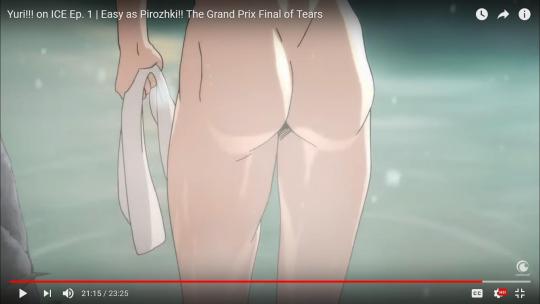
#moneyshot
I like this ending theme much better. It’s a head-bopper. The Instagram reel kills me.
Thanks to anyone who took the time to read through this stream of consciousness! No idea how long it may take me to get through the rest. I tip my hat to those who regularly and passionately participate in fandom. It’s a lot of work!
#yuri on ice#yuri!!! on ice#yuri katsuki#victor nikiforov#minako okukawa#hiroko katsuki#toshiya katsuki#mari katsuki#yuko nishigori#takeshi nishigori#celestino cialdini#yuri plisetsky#episode1#myblogisMYsafeplace#hashtagskeepmefrombabbling#yoi rewatch#makkachin#vicchan#yoi
10 notes
·
View notes
Text
Guilty of People Pleasing? How to Stop (Even if This Is How You've Survived Until Now)
New Post has been published on https://vestedbeauty.com/guilty-of-people-pleasing-how-to-stop-even-if-this-is-how-youve-survived-until-now/
Guilty of People Pleasing? How to Stop (Even if This Is How You've Survived Until Now)
OK, so, it’s possible that my people pleasing way of life was just coded into me based on the stars and planets. I’m not personally really into astrology but a lot of people I love are. So, I’ve learned that I may be the Libra-est Libra who ever Libra’d. And apparently people pleasing is a thing for us.
But while I weigh that a bit (sorry, Libra joke), I’m going to go share my thoughts on this… trait? Flaw? Coping mechanism? Well, whatever category people pleasing falls into, let’s take a look.
It’s a Good Thing Puppies Are Cute
She’s nearly four now but Pickle has settled down a whole lot. (I’m currently working through a dog training course with her and the rest of the pack to see if we can end the jumping up on people nonsense.) When she was tiny, she did a pretty good impression of The Very Caterpillar. She ate through our slippers. She ate through our blankets. She even ate through the drywall in a couple of places.
“Pickle, it’s a good thing you’re cute,” we said, about a million times. And it’s true.
It’s the same with tiny humans. They smell bad. They cry and cry and cry. And they leave their parents exhausted to the point they can barely remember their own names. But on the deepest level there is, we bond with them to the point we’d give our lives to save them.
Still, it’s a good thing they’re cute.
In part, a baby’s cuteness is a way of people pleasing. We cannot function or even survive on our own. Our survival depends on our parents being willing to take care of us, even though we offer nothing in return.
Last One In Is a Rotten Egg!
Fast-forward a few years, and our world expands from our parents and immediate family outward to include friends, teachers, and a whole lot of people we’ve never met. Humans being humans, we start forming smaller groups.
Like it was programmed into us, we can get pretty ruthless as we sort through the crowd of humanity. Yes to this one, no to that one. We find best friends and second-best friends (remember that?), and we learn how to fit in.
But we also get some brutal lessons about living in kid society. We discover the pecking order, watching some kids rise to the top of the social order and others fall into a perilous place where they are practically untouchable.
The permanent rotten egg, the kid nobody seems to like – even enough to defend when human decency demands it. (I still think about some of the kids I grew up with who were socially brutalized, bullied, cast out. I hope they survived and healed, and while I’m glad I didn’t actively hurt them, I shamefully lacked the courage to befriend them.)
In this Lord of the Flies world, kids learn quickly how important it is to gather allies. Perhaps for the first time ever, they grasp the reality that if they piss people off, they will be shunned and thrust out into the cruel world on their own.
People pleasing becomes a survival mechanism. I believe that’s where it starts for many of us. We learn to walk, talk, and behave in ways that please our cohort enough to keep us safe.
Keep Your Hands and Feet Inside the Ride at All Times
It doesn’t take a genius to realize it’s crucial to fit into the box kid society draws for its members. Fit or face destruction.
So, we contort ourselves to fit. If some odd bit refuses to fold neatly into the box, we cut it off. Survival demands ruthlessness.
… Got a weird hobby? Not anymore.
… Have a weird freckle on the bottom of your foot? Shoes, forever.
… Freaky smart at some subject or another? No. Get a ‘B’ and live.
… Set your sights on a career that seems a little “extra”? Probably don’t talk about that anymore.
It’s not like that for everyone, of course. And there are pockets of welcoming hearts who’ll accept people as they are, thank goodness.
But I suspect this is when many people pleasers develop their modus operandi. People pleasing can look like:
Having a hard time saying no (or even wanting to)
Feeling gutted if someone’s displeased with you
Agreeing with what others decide because you know you can make anything work
Feeling like you’re responsible for other people’s emotions or experiences
Apologies… so many apologies… for everything
Conflict avoidance at any cost
A persistent craving for praise from others
Inability to admit or express “negative” emotions
Struggling to make decisions that impact other people
This nasty list makes sense when you understand that a people pleaser weighs the safety of every word, step, and choice. It makes even more sense when you realize they may have zero experience moving through the world in any other way.
When Enough Is Enough
As a young woman, I took all of this to the next level by choosing a very public life as a pastor’s wife for a couple of decades. Pairing my childhood fascination with Emily Post’s etiquette book with the deep desire to be a good example, I had that box’s contents under control. The stakes seemed to be of eternal significance, after all.
But I learned something huge, courtesy of one of many youth group outings that ended with dinner. It took decades for this lesson to register, but now I can’t unsee it.
“Kids don’t know diddly-squat about what’s good and what’s not good.”
Given the choice between filet mignon and a burger from McDonalds, pretty much every kid in every youth group we ran would choose the golden arches. I could rattle off a bunch of similar examples, but you get it. Discernment comes with age.
That’s why the nerd gets the girl… later in life. Once we can embrace our greatness, right in the face of a crowd that punishes outliers, we flourish. We can become who we were always meant to be. Not coincidentally, that’s when we also find deep personal fulfillment and a sense of finding and fulfilling our purpose.
Allowing some pre-pubescent ghost from decades gone by to dictate how you show up in the world just seems silly. That whole threat to expel you from society for not fitting in becomes laughable.
I mean, it’s not even a thing anymore, anyway.
Who, in the adult world, roams the halls of their home or workplace, shoving people into lockers? What adult taunts someone else about what they brought for lunch – or the fact that person dared to eat when people could see them? And what adult torments another adult for having a passionate interest in an offbeat hobby?
Ridiculous.
You’re Not the Boss of Me!
I’m half-obsessed with Scotland. Many of my family’s roots start there. I freaking love that place, the music, the terrain, the food, the whisky, the spirit of the people – it’s got my heart. Anderson there is like Smith or Jones in America. The Anderson crest reads “Stand Sure.”
Oh, the irony.
That hit me hard as 2020 came to a close. It was both the best and the worst motto I could imagine. These two words, I’d seen on a crest on the wall for as long as I could remember. But it wasn’t really for me.
Some people, as a new year approaches, choose a word for the new year to embody for them. I chose “Stand Sure.”
It felt dangerous. Like, I knew this was going to impact my whole “tread lightly” philosophy in life. I had absolutely zero ideas about how I’d possibly go about addressing my people pleasing. It was so ingrained in me, like when a surgeon refuses to cut out a brain tumor because the brain has grown around it. Or, like separating conjoined twins. This seemed like something I’d just have to live with forever.
MindFix Did the Impossible
I’ve done some woo-woo stuff along my personal development journey. That includes walking on fire, walking on broken glass, climbing redwood trees and jumping off (harnessed in!) to grab a trapeze, and SO many seminars. They all helped me grow. A lot. But during a long weekend in January, I got to work with the team at MindFix.
And it changed everything. But only in the areas where I’ve applied it so far (haha – only a few amazing, miraculous changes!)
Going in, I knew roughly that I wanted to work on this whole people pleasing thing. That’s it. I didn’t know how to even describe it. It felt embarrassing, vague, and permanent. In fact, we never actually discussed it directly. We worked on some other things. It wasn’t until a few weeks later that I noticed its absence.
I can’t even begin to explain how Erin and her team do what they do. I won’t even try.
But I can explain this…
I came to a realization that the SUPREME DIRECTIVE under which I’d lived most of my life… was proclaimed by a little kid. A little kid who’d choose a $.67 mass-produced burger over a delectable filet mignon.
You Don’t Know Nuthin’ about Nuthin’
That kid did her best to protect me. To her, safety depended on fitting into a box. Anything that didn’t quite fit should be bent or lopped off.
I’d outgrown her in every way. But I was still listening to her, so life apart from people pleasing felt dangerous. I still exhibited most of the symptoms above – and those behaviors were hurting me.
The work we did helped me go after this dragon and slay it. In realizing that kid version of me was just trying to help, but really didn’t know how, it opened a whole new possibility… just being me.
I could see evidence indicating it was safe to shut her down.
I have weird hobbies (drone flying, chicken raising, classic VW ogling, front yard gardening – just for starters). Nobody torments me over that. (I mean, can you imagine how insane that would be?)
My mate and I are flat-out weird (so much ink, in bed by 7, both creatives – and that list goes on). Nobody follows us, taunting us. (I mean, we did get called the perfect insult in the VW restoration world… Billy-Bob shade-tree Chip Foos wannabes – I can’t even tell you how many giggles I’ve had over that pejorative on our YouTube channel.)
Even my work life is strange (I’ve discovered that the way my brain operates is REALLY unusual. Some would see it as a huge plus; others would find it perplexing.)
And then there’s this one “flaw” that put me in danger of ostracism so much that I shut it down entirely… until I saw it differently and felt safe valuing it.
It’s my capacity to love, like geeking-out, human exclamation point levels of enthusiasm for certain people. (I always gathered that I was too sensitive, too excitable.) That one’s back in play big-time, and it adds incredible joy to my life. Like, one of my favorite things to do is to SEE someone’s greatness and then tell their story in a way that others see it, too.
If This Isn’t Irony…
So, “Stand Sure” is in play.
Undoubtedly, there’s still a little kid inside, desperately trying to keep me in line by pleasing people. But she sure seems quiet these days.
I did crack up, though, when a colleague mentioned that since the start of the year, I’d really started to own my own value. He continued, “I’m not seeing that people pleasing way you used to show up.” And that… that pleased me greatly.
Who knows what else is possible? The best is yet to come.
0 notes
Text
Cerebus #14 (1980)
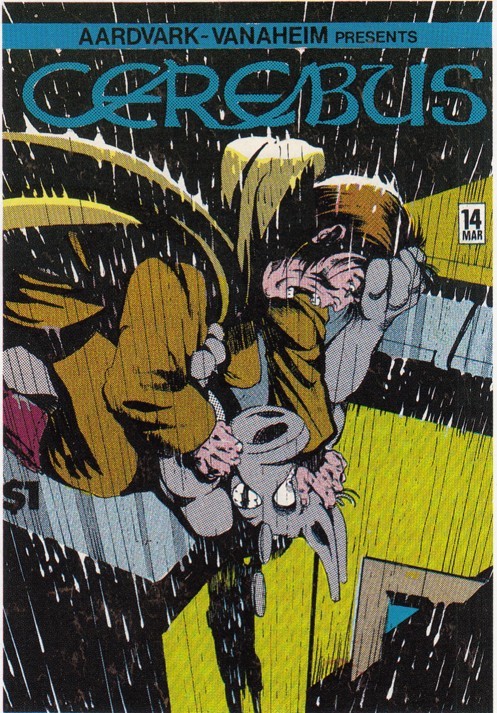
This is what happens to Cerebus because he still hasn't taken my advice to stab everybody he meets before they become a huge annoyance.
I'm not suggesting everybody stab everybody they meet so that they'll never have to deal with any non-stabbing drama because then everybody I meet would be trying to stab me. That sounds like a bad social contract. A good social contract is to not talk to anybody at all in public unless they work in the service industry and also maybe don't make such aggressive eye contact with people on the street? I'm just trying to get from Point A to Point B with as little human contact as possible. I wouldn't mind interacting with people except for one huge problem: most people are way more terrible than they realize. And the more enthusiastic and social a person is, the more likely that they're the real life version of Red Sophia or Elrod.
On a similar note, I really love this thing where we're all wearing masks. Now if we can just develop a virus that spreads through eye contact so we're all forced to constantly wear dark glasses, I'll be pretty fucking happy about the state of the world.
I mean I'd be happy with the state of the world in regards to what I have to deal with when I go outside (which is people trying to talk to me and looking into my eyes). I don't mean I'd be overall happy with the state of the world which is fucking terrible because a bunch of assholes think teenagers telling them they can't say retard on the Internet is worse than Donald Trump and the GOP's self-serving style of governing where they think taxes shouldn't be used to make the country better but should just go back into the pockets of corporations and Wall Street pricks and other politicians and the already extremely wealthy. Also, a lot of centrist Democrats think the same way. They're only more acceptable because they mostly aren't racist, sexist homophobes.
Now that all the snowflakes have stopped reading and went to hug their guns in consolation of my mean Internet words, I can get to the review.
In "A Note from the Publisher," Deni claims this is the funniest issue of Cerebus to date. Since it's Cerebus' first visit to Palnu, I'm not even questioning her claim. It's almost certainly true.
Dave Sim's Swords of Cerebus essay is a textual stroking of Prince Valiant creator Hal Foster's dick. Sim's mostly talking about Foster's art style but he obviously decided to mimic some of Foster's story telling style as well. See, Prince Valiant was a continuous story that ran (or has run? Is it still going by his son or grandson or something?) for decades, a story which chronicled the life of Prince Valiant and, eventually, his children. Cerebus is a comic book that didn't run for as long but whose continuing story was easier to follow and had a drunk aardvark as the main character. So there are some similarities there, right? This was also the first issue of Cerebus after going to a monthly schedule. Dave Sim would now have to do 300 issues instead of the 150-something he had been planning. Ha ha! Sucker.
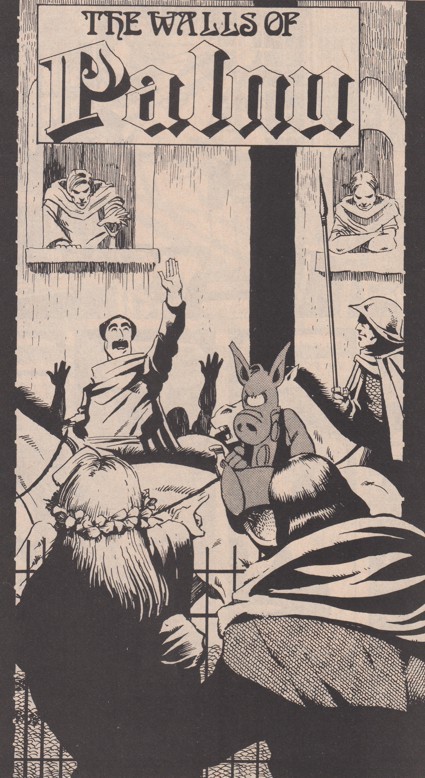
This would have been a most opportune time for Cerebus to start his stabbing people upon meeting them practice.
I knew at some point I was going to have to admit this so I might as well begin with it: I don't think I've ever sat through an entire Marx Brothers movie. It's possible I have but I just don't really remember because it happened so long ago. But I need to also reveal this: I loved Groucho Marx as a kid. I've revealed before that I had a grandfather fetish as a child. I loved hanging out with old men and I loved watching old men on television. Going in Style was one of my favorite movies and I simply adored Art Carney. I also loved The Shining because it was about a young kid who got to hang out with one of my other favorite older guys, Scatman Crothers. Groucho Marx in You Bet Your Life fit into the old guy category. I don't think he was as old as the oldest men I loved but, as a young kid, he certainly seemed ancient. I think the duck that dropped down when somebody said the secret word helped a lot. But I would watch reruns of You Bet Your Life whenever I found them on television because it was like hanging out with an old man, my favorite pastime from around four to ten or so. As for Groucho's movies? I've definitely watched parts of some of them as I stumbled on them on television and realized he was in it. But I've never made the effort to start one from the beginning and watch it all the way through. I should probably rectify that.
Cerebus has wound up in Palnu thanks to a short diversion in a comic strip that appeared in The Comic Buyers Guide. He wound up marooned on an island with Lord Julius' son, Lord Silverspoon. Upon being rescued, Lord Julius decided to reward Cerebus for saving his son. I don't have the issue of Swords of Cerebus with that story so I can't comment on how annoying Lord Silverspoon almost certainly was.
Cerebus' reward is to be put in charge of Lord Julius' security forces and granted the title of "Kitchen Staff Supervisor." It doesn't make any sense because Lord Julius invented bureaucracy. He realized the only thing that can really keep a leader safe is to make sure that nobody else knows what the fuck is going on.
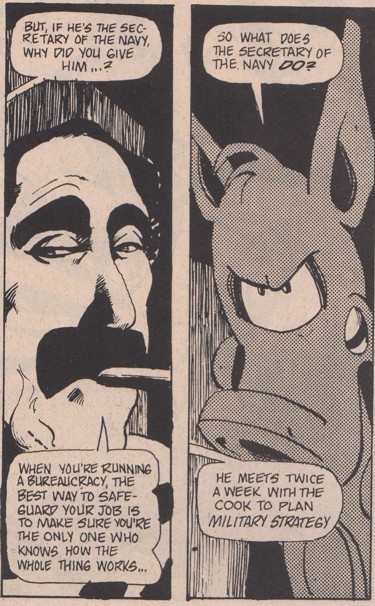
Oh, see? I suppose I could have just read a few more panels and realized Lord Julius explains it himself.
As Kitchen Staff Supervisor, Cerebus' job is to keep assassins from assassinating Lord Julius. Aside from that, he was pretty much free to do whatever he wanted. Unless he only thought he was free to do whatever he wanted and whatever he wanted was whatever Lord Julius was manipulating him into wanting. Lord Julius is a master of getting people to accidentally do the thing they didn't think they would ever do that Lord Julius also didn't want them to do but actually secretly did want them to do. Basically anybody who has recently spoken with Lord Julius is actively doing Lord Julius' bidding, whether they know it or not.
For some reason, Cerebus decides to take on the role of Kitchen Staff Supervisor even though it's the most boring thing he's ever done in his life. At least it's entertaining for the reader because nearly every line out of Lord Julius' mouth is a solid gag. And since I haven't really seen any of Groucho's movies, I can't say how many of the gags were stolen outright! I have to assume it's all new material and only Groucho Marx parody. Some people, in an attempt to never be fooled by anybody, never believe anything at all. I am not one of those people. I believe everything I hear until somebody slaps me and yells, "How can you believe that obviously falsified tripe, you fucking moron?!"
Assassins try to poison Lord Julius and Cerebus tracks them down to an underground group trying to free the city from the clutches of Lord Julius. When the assassin, Cerebus, and Lord Julius wind up in the same place, Cerebus outs himself as a spineless centrist.
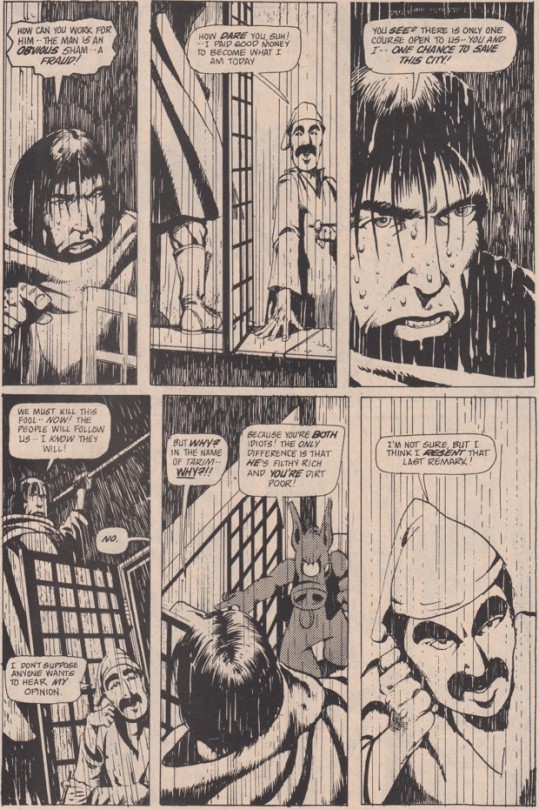
The Centrist loves to believe that not taking sides is the only logical conclusion to any matter that doesn't seem to immediately affect their lives.
Some people are probably wondering how that previous caption is a negative criticism. "Um, yeah. Seems about right. If it doesn't affect me, why should I offer up an opinion!" And yet when a situation exists where one side is full of abusive and manipulative people controlling the reins of power and the economic purse strings of the country and the other side is being bullied, cheated, and abused by that side, not taking a side is siding with the powerful and the abusive. Even if your life hasn't been affected.
Of course, Cerebus doesn't need to take a side here. I mean, he does take a side: he sides with the people who have all the money. But he doesn't really care is the point. You'll see he retains this philosophy of rich people winning every argument later when he's Pope and gives out his wisdom that "God loves rich people which is why they're rich and hates poor people which is why they're poor." Pretty much the philosophy of evangelicals in the U.S.
Cerebus survives the battle with the assassin and then gives Lord Julius some free advice about running the country. So Cerebus kind of does agree with the assassin but also the assassin wasn't paying him anything so he deserved to be thrown five stories to his death. Lord Julius says, "You can rest assured that I'll give the matter all the attention I feel it deserves." Is there a better way to tell somebody to shove it than that? It's so elegant!
In Aardvark Comments, Dave Sim answers a letter on how to go about self-publishing. And so his role as Independent Comic Book Publishing Mentor begins! In his list of things you'll need to get together to successfully publish your own comic book, he kindly leaves out "talent." Obviously Dave understood how to go about getting something published but he also put in the hard work and had the talent to produce a comic book that began well above mediocre or average. I can't imagine a lot of self-published books began at this high of a plateau. And even if they were eventually capable of Cerebus quality, how long are readers going to give them to get there? Probably not even two issues, would be my guess.
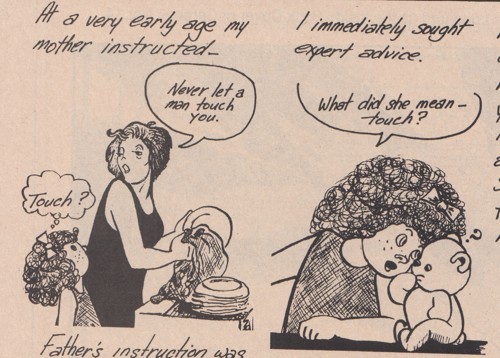
The Single Page had a comic called "Sex Education" by April. I thought the first two panels were cute.
Cerebus #14 Rating: A+. As with Elrod and Red Sophia and The Cockroach, Lord Julius' first appearance is a banger. Dave Sim never once falters with Lord Julius' repartee. Solid gags throughout. Sim really is a master of dialogue and, to think, it only gets better.
0 notes
Text
Kristiana Willsey, "Fake Vets" and Viral Lies: Personal Narrative in a Post-Truth Era, 131 J Am Folklore 500 (2018)
"Stolen valor" confrontations calling out "fake vets" have generated a popular genre of viral video, a highly concentrated and visible expression of contemporary anxieties over the commodification of identity online. The boom in first-person stories, particularly traumatic ones, has oversaturated the attention economy of the internet, creating a market for fakes that real veterans can't criticize without challenging the authenticity of their own stories.
"POST-TRUTH" WAS THE OXFORD DICTIONARIES' 2016 word of the year,1 a year in which political pundits wrung their hands over journalistic standards, and "fake news" that thrived by confirming readers' gut feelings became the story itself. This triumph of emotional appeals over hard evidence is the dark side of the storied age we live in. As social media blurs the boundaries between personal narratives and public discourse, the lived experiences of strangers are more accessible than ever before. Shaky cell phone footage of real people, making eye contact and directly addressing unseen audiences, has replaced the need for fact-checking with the immediacy of oral storytelling. Personal narratives gather public audiences by pretending to disavow them; they circulate so readily because they are presented as individual experience, even as they escape their authors and become, through sheer volume, persuasive ideology. In this paper, I examine "stolen valor" viral videos as a highly concentrated and visible expression of contemporary anxieties over the commodification of identity online. The boom in first-person stories, particularly traumatic ones, has oversaturated the internet's attention economy, creating a market for fakes that real veterans can't criticize without challenging the authenticity of their own stories.
The practice of confronting and calling out "fake vets" (which includes both civilians lying about military service, and active and former military embellishing their records or claiming unearned decorations) has generated a now well-established genre of viral video: "stolen valor," a subcategory of the larger phenomenon that Know Your Meme calls "justice porn": "true stories and online media depicting events in which criminals, bullies, and other aggressors are thwarted, exposed, or punished" (Caldwell 2013). The term "stolen valor" comes from a 1998 book by Vietnam veteran B. G. Burkett, which started a public conversation leading to the Stolen Valor Act of 2005, making the wearing of unearned military decorations a felony. It was overturned in 2012 as a violation of free speech, then reinstated by President Barack Obama as the Stolen Valor Act of 2013, criminalizing lying about one's military service only if the lie results in some material gain—essentially, a special category of fraud. But if the law won't or can't punish you, the public will give it its best shot. Videos of possible fakers with sloppy piecemeal uniforms being confronted and humiliated have been posted on YouTube and Facebook since at least 2010, when Staff Sergeant Anthony Anderson started naming and shaming fake vets on his Stolen Valor Facebook page and eventually his Guardian of Valor website (Mockenhaupt 2016).

Figure 1. Stolen valor "Starter Pack": a set of curated images providing a quick visual introduction to a topic or meme.
Titles like "Veteran of 2/506th Calls Out Fake Ranger at Oxford Valley Mall," "Special Forces Soldier Calls Out Fake SF at T. F. Green Airport, Stolen Valor," or "Best Stolen Valor Fights 2016" each garner millions of views on YouTube, promising cathartic, vicarious satisfaction at seeing liars unmasked and publicly scorned.
The truth value of a claim is inseparable from the identity and perceived military credentials of the claimant (see also McNeill 2018). One Redditor sums up the generic conventions of stolen valor videos in a series of bullet points: the confrontation takes place at a mall, the accused is homeless, obese, has facial hair, or is a woman. The list is descriptive—it doesn't differentiate between how the average accuser determines stolen valor and how the commenter does (in other words, he's naming common features of stolen valor videos, not necessarily agreeing that these are evidence of stolen valor itself). Yet a persistent theme in these aggressive accusations is deviation from a kind of ideal masculinity. In one thread in which vets share experiences of being falsely accused, a commenter notes baldly that she's a woman, so no one ever believes she's a vet. Another commenter responds that as a skinny Asian man, he gets more than the usual share of suspicious looks.2 "King of the genre" and ex-Navy SEAL Don Shipley began making callout videos when he realized a Marine he had lauded had lied about being combat-wounded. As a profile of Shipley in the Washingtonian puts it, "there was something fishy about the guy. He was obese, unkempt—un-Marine-like" (Gaynor 2015). By the same measure, when the accused cringes, goes on the defensive, or actively runs away, many commenters take this as evidence that they are indeed a fraud—a "real vet" would have responded with a cool "fuck off."

Figure 2. Screengrab of a Reddit thread on Stolen Valor.
The explosion of entitlement critiques online speaks to the ways in which identity and reputation are increasingly tied to livelihood. The military blog This Ain't Hell includes an explanatory section on stolen valor that explicitly discusses the relationship between the Supreme Court and the court of public opinion: "The Supreme Court essentially gave us a warrant to hunt down these valor thieves and expose them to the public. Justice Kennedy wrote in US v. Alvarez that 'Truth needs neither handcuffs nor a badge for its vindication.' That means that we don't need the government regulations or law enforcement to expose liars to the light of truth" (Lilyea 2015). This sentiment might ring familiar; it's certainly come up on my Facebook page a lot recently: freedom of speech is not freedom from judgment. Your right to talk is other people's right to disagree. Indeed, there are a variety of available responses to unpopular opinions that fall well short of being jailed for sedition, including losing your job or having your picture become a punch line on late-night talk shows. The comment communities on military sites like This Ain't Hell, Task and Purpose, The Duffel Blog, and the "Stolen Valor" subreddit are divided in the best approach for dealing with extralegal violations of the social contract: Should they just embarrass them, or should they punch them in the face? The performative call-out culture of stolen valor is just a few shades across the political spectrum from, say, debates over whether two white women in Oregon can start a burrito truck (Schladebeck 2017), a fact not lost on the "red feed" (conservative social networks; see Keegan 2016). In response to a "stolen valor fail" video in which an overzealous vet embarrasses himself by accusing a man of stolen valor simply for wearing camo, one Redditor comments: "It reminds me a lot of the appropriation charges SJWs [Social Justice Warriors] raise. So this is like 'military appropriation'?"3
Debates over the significance of stolen valor are inevitably debates over how something intangible can be stolen and what is really at stake. Doug Sterner, a Vietnam vet and stolen valor detective (his wife Pam Sterner helped draft the legislation for the first Stolen Valor Act) says, "People look for some deep-seated reason why they do this. . . . But I go back to that old comment about asking a bank robber why he robs banks: ''Cause that's where the money is'" (quoted in Gaynor 2015). We can speculate generously and sympathetically about the complex psychosocial motives behind lying, but the overlooked answer is the obvious one: people pretend to be veterans because there is something there to steal. Yet this cultural capital is a coin you can't spend on yourself, because the value of "authenticity" relies on the originator somehow existing on a rarefied plane outside of commerce. (This is, of course, the parallel to cultural appropriation—a tamale recipe or an African American spiritual didn't seem to have any value until a white chef or performer "elevated" it.) Because the market in authenticity relies on its naturalness, trading on your own stories commodifies and thus devalues them.
Unlike money, which accrues value through circulation, personal narratives as a currency lose credibility as they move through the world. Anything trading on authenticity is "diluted" by reproduction; repetition opens up a story to charges of insincerity (Benjamin 1955). Hyperconscious of the oversaturated market for war stories, many vets confess to withholding their stories in an attempt to avoid false accusations. One Redditor comments: "I've had guys get livid with me over simple stories and would even go so far as to ask for ID and a DD214. I used to post on a website that had a forum about phonies. I stopped posting and reading there because there were too many people who were gung ho for calling someone a fake that they couldn't seem to see anything else."4 The uncritical adoration of civilians, eager to perform patriotism by thanking vets for their service, can make even genuine military service feel inauthentic; one distances himself from fakers by noting that "civilian wannabes are fucking embarrassing. I don't tell people anymore because the hero worship makes me uncomfortable."5 To some vets, the existence of an active market for war stories renders any public statement of one's military service a commodity, and thus inauthentic. As one Redditor writes: "It's really easy to avoid getting called out for stolen valor: don't wear your uniform to things which do not require it."6 Others on the thread agree that wearing your uniform to the airport or the mall, to cut the line or court public approval, is "flaunting" your service to an embarrassing degree. Discretion, after all, is the better part of valor.
Publicity may commodify and devalue personal narratives, but the boom-and-bust cycle of viral fame makes them good short-term investments for online publications. Kay Turner's presidential letter (to members of the American Folklore Society) last March reminded us that we live in a "storied age"—"driven primarily by the current hegemony of the 'me' story. . . . Stories about individuals told from their point of view appear to rule the day" (2016). Turner voices concern that this pop culture vogue for personal narrative renders them disposable, and she offers as an antidote the continuity and collective ownership of folklore. But if personal narratives become disposable, what does that mean for their tellers? Slate columnist Laura Bennett calls the rise of the "me story" "the first-person industrial complex," emphasizing the premium paid for a convincing show of intimacy (2015). Suffering sells; journalist Jia Tolentino observes that the first-person boom has "helped create 'a situation in which writers feel like the best thing they have to offer is the worst thing that ever happened to them'" (quoted in Bennett 2015). Vets too often feel that the complexity and variety of their service experiences are reduced to a grim sound bite, that their stories are valued mostly as a measure of how damaged they are (Willsey 2015). If personal narratives are most valuable and viral when they capitalize on pain, must everyone suffer to be heard?
Part of the appeal of first-person narratives—certainly for overworked editors of the voracious market for digital content—is the impossibility of fact-checking someone else's emotional truth. Historian Molly Worthen sees a linguistic trend of the past decade, replacing "I think" with "I feel like," as evidence of a new individualizing of morality. Both are a means to soften or hedge an assertion, but while "I think" is not "I know," it is open to correction in a way that "I feel" is not. You can think, and be wrong, and admit it, but your feelings are your own—your body has its own truth. Worthen argues that "'I feel like' masquerades as a humble conversational offering, an invitation to share your feelings, too—but the phrase is an absolutist trump card. It halts argument in its tracks" (2016). Medical anthropologists Didier Fassin and Richard Rechtman observe that over the past few decades, pain has become tied to authenticity; bearers of traumatic narrative have gone from being seen as "weak, dishonest, perhaps a phony or profiteer" to "the very embodiment of our common humanity" (2009:23). At the same time, post-traumatic stress disorder (PTSD; or, in previous generations, "battle fatigue" or "shell shock") has gone from being a medical diagnosis of the few to the spoiled identity of the many—somehow without losing its ability to alienate and "other," even as the label's use has broadened and the numbers who carry it climbed.
The specter of mental health hovers over stolen valor confrontations in the broad way that mental health becomes a catch-all to describe or excuse any violation of normative social behavior. Disability is a leitmotif in debates about how best to handle stolen valor, with vets vacillating between anger at those who seem to know what they're doing to pity and embarrassment for the ones who (in the videos, at least) seem confused or mentally ill. But the flip side of asking for leniency for people with mental health issues is the cynical expectation that people commonly fake mental health issues in a bid for leniency. In a viral video from military-owned apparel company Ranger Up, "Stolen and I Know It" (to the tune of LMFAO's "Sexy and I Know It"), the unrepentant faker sings, "When you challenge me, I'll just claim PTSD."
The video is expressing a belief that trauma is a useful foil for narrative because it exempts the teller from scrutiny. But it also, I would argue, reflects anxiety about how the present medical and political landscape for vets recognizes trauma more broadly and less usefully, so that the category has grown and the care has not. This concern over scarce resources comes through clearly in comments on a parody Duffel Blog article titled "Son Proudly Follows in Father's, Grandfather's Footsteps in Faking Military Service." The commenter misses the joke and responds, "I BET THIS GUY GOT A PHONY VA DISABILITY FASTER THAN A REAL VET WHO IS IN NEED, AND SERVED PROUDLY. wHAT A CROCK OFSH—."7 The subtext is that, like it or not, your personal stories are the currency by which you access care, and other people's lies could, like counterfeit coins, cheapen or dilute your truth.
Pushing back against this volatile marketplace for personal narrative, a corresponding body of "stolen valor FAIL" videos calls out the embarrassing fervor of vigilante justice. Videos where the tables are turned and it is the accuser who is humiliated draw attention not to fraud, but to the hypersensitivity of vets so insistent on defending an intangible, idealized "valor" that they harass the homeless, get into fistfights in parking lots, and not infrequently catch real veterans in amateurish traps. A characteristic take comes through a series of parody videos made by Jack Mandaville and Patrick Baker of Ranger Up and Adam Linehan of Task and Purpose. In the first film, two vets observe a man panhandling in a cartoonishly inaccurate uniform, claiming an improbable service history bolstered by a few place names and clumsy jargon plucked from movies and the news.8 They recognize him for a liar but turn the other cheek, walking away to focus on their real lives, their unfinished business. The next two videos in the series go further to mock the accuser; in "How to Handle Stolen Valor: Part Deux," a friend jumps in just as the other pulls out his phone and reminds him, kindly but firmly, "You were a water tech. Nothing about your service was that special, so you need to let it go, buddy."9 The only thing more embarrassing than lying, it seems, is feeling threatened by a lie. Dismissing the fragile masculinity of anyone who needs to affirm his self-worth by calling out other people's lies, one Redditor reflects that "the loudest and the proudest are always the ones who didn't do fuck for shit."10 Another replies, "yeah it's the guys who fixed air conditioners in kuwait who demand a veteran discount at every fucking store and immediately want to talk to a manager." If your valor is not currency, no one can steal it.

Figure 3. Screengrab of parody music video "It's Stolen and I Know It."
Since "real vets" have nothing to prove, confrontations can backfire and lead to counteraccusations, making the entire process of challenging a lie a risky venture. A YouTube video uploaded to Reddit as "Questionable Stolen Valor confrontation turns into a shitshow" becomes a digital pile-on, with a hundred comments mocking the filmmaker's incoherent rage at a confused hunter wearing camo.11 His accusations of fraud are quickly turned around on him; one Redditor remarks: "I have a feeling the cameraman is the one who is lying about having served," while another wonders pointedly: "How does such a fragile, whiney person get through boot camp?" The pile-on reminds others that they are also at the mercy of this pervasive culture of entitlement critiques; another says: "I'm always worried that someone like that would target me when I'm playing airsoft with my buddies." On a different thread about false accusations, a Redditor details three separate misunderstandings and confrontations, concluding that "I'm at the point I never mention I'm a soldier unless I have to, yall are crazy suspicious motherfuckers."12 On either side of a confrontation, justly or unjustly, you might become a viral laughingstock.
Writing about the troubling ways our stories can be taken from us and used to further other agendas, Arthur Frank notes: "As trickster stories teach us, to slip one trap is to become prey to another—the world is filled with traps. Rather than outrage, perhaps we should recognize a necessary dialectic, even a complementarity, between aspirations of authenticity and recognitions of appropriation. . . . Authenticity—a very slippery claim—may be visible and experienced only in reaction against appropriation" (2009:196). Perhaps those creating and consuming this genre do so because it makes their own stories feel more secure; they find their own fragile sense of significance in opposition to them. Yet any genre in which authenticity must be proven must continue to prove itself, must be constantly taking on challengers. Fittingly, the "Stolen Valor" subreddit includes a spectrum of posts from "I think this guy's a fraud" to "Can you believe these guys thought I was a fraud?" to "Does this hat make me look like a fraud?" In that third category, non-military people stop by to ask whether their camo blouse or vintage military coat will give offense, with the same anxious delicacy that a white college student might ask her Black classmates if singing the lyrics to a Kanye song alone in her car make her racist. Given the breakdown of distinction between public and private life and the impossibility of controlling how any act of self-expression might be interpreted once it's removed from context and multiplies around the web—who wouldn't be anxious?
Our online subcultures or "feeds" (whom we follow on Twitter or Instagram, how we curate sympathetic audiences and mute critics) are sometimes referred to as a "bubble"—but bubbles are notably both transparent and fragile. The ease with which the internet allows, for instance, queer teenagers in small Midwestern towns or individuals with rare medical diagnoses or fans of obscure anime to find one another also extends to the people who want to find them. My Twitter and Instagram accounts re-post to Facebook; my YouTube profile is linked to my Gmail; unrelated websites rely on hosting services like Kinja or Disqus that share my comment histories across disparate platforms. This collapse of contradictory identity performances is largely in the service of the attention economy, courting increasingly scarce clicks by selling your browsing history to marketers, who create detailed profiles to make you offers you can't refuse. The monetization of identity on social media means you don't own your performance of self—the platforms you use own it. As David Birch writes of Facebook in Identity Is the New Money, "in a social media world there's an inevitable agglomeration of power attendant on identity provision" (2014). Your stories are always already currency, but not necessarily for you. Individuals who decide they want to turn a profit from their own performance of identity, to be compensated as content creators rather than just tracked as ad revenue, are dismissed as a lower order of reality stars—"influencers" and YouTube personalities, the (fool's) gold standard of inauthenticity. Vets who shy from the limelight will still find war stories making money for advertisers, producers, and politicians.
There are no shadows on the internet, only the privacy of hiding in a crowd. Once we joked that "on the internet, nobody knows you're a dog." But as web traffic is funneled into fewer platforms, controlled by increasingly fewer hands, it's become impossible to expect to maintain multiple faces for different audiences. Anything said in any context, from "sexts" to racist memes to rationalizations of problematic faves, must be acceptable in every context. Everything is canon; every version of yourself is happening at the same time and in the same place. Perhaps it is this sea change in privacy expectations driving a wave of entitlement critiques across the political spectrum, from stolen valor confrontations to condemnations of whitewashing and "straightwashing" in popular culture to the gatekeeping of gamergate and "fake geek girls." If we can no longer control our own narratives (with all the multiple positionalities and subjectivities that requires), why should we permit anyone else to tell their stories unchallenged? The chaotic new narrative economy of the web must be continuously and minutely defined.
The commodification of identity online makes us uncomfortably aware of our status as capital—if valor can be stolen, it can also be hoarded, traded, squandered, spent. The appetite for these videos and the anxiety they produce are mutually constitutive; comparing their own stories to viral lies in order to reassure themselves of their own truth, viewers realize that truth is always provisional, contingent, and embattled. Stolen valor confrontations are as popular as they are embarrassing because calling out a lie places both the accuser and the accused on a scale of relative entitlement where the accuser's claims are equally vulnerable. It requires at least a fleeting awareness that the stories of our lives are not our lives. Entitlement critiques expose the seamy underside of language. Calling someone out punctures the narrative envelope, overturning the smaller world of the story and replacing it with the larger, more complex and dangerous world that the story is needed to contain. "Fake news" thrives in the narrative economy of the web because we measure every story not against the world, but against ourselves. Truth is not a matter of what you know, but of who you are, and in a virtual marketplace of identity we have increasingly little control over, we can't afford to change our minds.
Notes
https://www.oxforddictionaries.com/press/news/2016/12/11/WOTY-16.
Reddit, June 18, 2015, https://reddit.com/r/Military/comments/3abxxu/has_anyone_here_ever_been_accused_of_stolen_valor/#bottom-comments (accessed October 15, 2017).
Reddit, September 1, 2016, https://www.reddit.com/r/cringe/comments/50q8pa/questionable_stolen_valor_confrontation_turns/#bottom-comments (accessed October 15, 2017).
Reddit, November 4, 2016, https://www.reddit.com/r/StolenValor/comments/5b4qgo/psa_stop_harassing_crazy_people/ (accessed February 9, 2017).
Reddit, September 21, 2017, https://www.reddit.com/r/starterpacks/comments/71lcmx/stolen_valor_video/#bottom-comments (accessed October 15, 2017).
Reddit, March 22, 2015, https://www.reddit.com/r/StolenValor/comments/2zxkwl/what_would_a_real_vet_do_if_called_out_as/#bottom-comments (accessed February 9, 2018).
G-Had, "Son Proudly Follows in Father's, Grandfather's Footsteps in Faking Military Service," Duffel Blog, June 6, 2012, https://www.duffelblog.com/2012/06/son-proudly-follows-in-fathers-grandfathers-footsteps-in-faking-military-service/ (accessed October 15, 2017).
Adam Linehan, "stolen valor part 01 9 12 v01," YouTube, September 12, 2016, https://www.youtube.com/watch?v=Qalynem0bKI (accessed October 15, 2017).
Adam Linehan. "stolen valor part 02 9 13 v01" YouTube. September 13, 2016, https://www.youtube.com/watch?v=-9EewGqRPZE (accessed October 15, 2017).
Reddit, September 21, 2017, https://www.reddit.com/r/starterpacks/comments/71lcmx/stolen_valor_video/#bottom-comments (accessed October 15, 2017).
Reddit, September 1, 2016, https://www.reddit.com/r/cringe/comments/50q8pa/questionable_stolen_valor_confrontation_turns/#bottom-comments (accessed October 15, 2017).
Reddit, June 18, 2015, https://reddit.com/r/Military/comments/3abxxu/has_anyone_here_ever_been_accused_of_stolen_valor/#bottom-comments (accessed October 15, 2017).
References Cited
Benjamin, Walter. 1955. The Work of Art in the Age of Mechanical Reproduction. In Illuminations, pp. 219–53. New York: Harcourt, Brace, and World.
Bennett, Laura. 2015. The First-Person Industrial Complex. Slate, September 14. www.slate.com/articles/life/technology/2015/09/the_first_person_industrial_complex_how_the_harrowing_personal_essay_took.html (accessed October 18, 2016).
Birch, David. 2014. Identity Is the New Money. London: London Publishing Partnership. eBook.
Caldwell, Don. 2013. Justice Porn. Know Your Meme. (accessed January 10, 2018).
Fassin, Didier, and Richard Rechtman. 2009. The Empire of Trauma. Princeton, NJ: Princeton University Press.
Frank, Arthur. 2009. Tricksters and Truth Tellers: Narrating Illness in an Age of Authenticity and Appropriation. Literature and Medicine 28(2):185–99.
Gaynor, Michael J. 2015. If You're Lying about Being a Navy SEAL, This Man Will Catch You. Washingtonian, August 30. www.washingtonian.com/2015/08/30/if-youre-lying-about-being-a-navy-seal-veteran-don-shipley-will-catch-you/ (accessed October 15, 2017).
Keegan, Jon. 2016. Blue Feed, Red Feed: See Liberal and Conservative Facebook, Side by Side. Wall Street Journal, May 18. http://graphics.wsj.com/blue-feed-red-feed/ (accessed June 14, 2018).
Lilyea, John. 2015. What Is "Stolen Valor"? This Ain't Hell (But You Can See It from Here), October 14. www.thisainthell.us/blog/?p=62317 (accessed October 15, 2017).
McNeill, Lynne S. 2018. "My friend posted it and that's good enough for me!": Source Perception in Online Information Sharing. In "Fake News," ed. Tom Mould. Special issue, Journal of American Folklore 131(522):493–9.
Mockenhaupt, Brian. 2016. The Stolen-Valor Detective. Atlantic, December. www.theatlantic.com/magazine/archive/2016/12/the-honor-guard/505859/ (accessed September 14, 2017).
Schladebeck, Jessica. 2017. Oregon Burrito Shop Run by White Women Shuts Down amid Accusations of Cultural Appropriation. Daily News [New York], May 24. www.nydailynews.com/news/national/burrito-shop-closes-accusations-cultural-appropriation-article-1.3192942 (accessed October 15, 2017).
Turner, Kay. 2016. A Message to AFS Members from President Kay Turner. AFS Review: News, March 17. www.afsnet.org/news/280836/A-Message-to-AFS-Members-from-President-Kay-Turner.html (accessed October 18, 2016).
Willsey, Kristiana. 2015. Falling Out of Performance: Pragmatic Breakdown in Veterans' Storytelling. In Diagnosing Folklore: Perspectives on Disability, Health, and Trauma, ed. Trevor Blank and Andrea Kitta, pp. 277–300. Jackson: University of Mississippi Press.
Worthen, Molly. 2016. Stop Saying "I Feel Like." New York Times, April 30 www.nytimes.com/2016/05/01/opinion/sunday/stop-saying-i-feel-like.html (accessed April 30, 2016).
#AFS ethnographic thesaurus#social media#authenticity#stolen valor#first-person narratives#veterans#military medals#impostors#identity#commodification#commodification of identity#fabulism#viral videos#viral fame#fraud#meme
0 notes
Text
The Roles of Fandom
Here is a little large guide to some of the roles people play within fandom.
[Note: I actually had the outline of this essay written for about a year, including most of the ‘roles’ listed in this post, but I have only now gotten around to writing this properly!]
I’ve been involved in several different fandoms since I first joined the World Wide Web back in 2002, with my first major fandom coming a few years later. As a result, this post is mainly based on my own experiences within fandom, although over the years I have had numerous conversations with numerous people who share my views about the mentality of fandom and the clear hierarchies, cliques and statuses, which have helped me broaden my mind and open my eyes to the reality of it all. It’s something I have always found fascinating, which is why I often analyse the goings on within fandoms to assess the clear roles most people often fall into.
I also feel I have the ability to see things from many different points of view, as I myself have been in several different roles in different fandoms over the years; I have been the new girl, I have been a popular blog with praise heaped upon me, I have been sucked into an unhealthy group (the Mean Girls - more later), I have entered an already established fandom and managed to climb up the ladder, I have watched a fandom fall apart due to trolls and bullies (which I also happened to be a victim of), and I have also been the lurker - the outsider looking in.
As a result of this, I came to the conclusion a long time ago that the whole concept of fandom - any fandom - is a game. Everyone is playing, it’s just they may not realise it until they....stop playing. Hindsight can really open your eyes to your own behaviour - good or bad - and others’ behaviour too, and it can also teach you a lot about yourself. It has definitely taught me a lot about myself, and in order to write this post, I have had to look back at the certain roles that I myself have played since my first key fandom back in 2006. I have absolutely made mistakes and interacted with the wrong crowds, and there is a lot of stuff in my fandom history that makes me cringe on recollection, but it’s these experiences that have taught me what I know and are part of the reason why I find it all so fascinating; the mentality of it all, and what it can say about you and all of your peers who are generally just trying to bond over this thing you all love.
This post is looking at the specific roles you will find being played in each and every single fandom. It doesn’t matter if it’s a band’s fandom, a TV show, a film, a book - whatever it is, it is my belief that you will find these people (to varying degrees) in every single fandom.
Before I start, I want to clarify a few of things. First, (and I delve into this deeper at the end of the post), I know things aren’t always as black and white or as clear cut as they may appear when I’m talking about certain roles. For the purpose of this post, I’m not really discussing the grey-areas, as that would make this post about a million words longer and it’s long enough already!!
Secondly, there are absolutely “ranks” within each role I mention. There is definitely a scale from about 1-5 in each role, although I generally talk about the most “extreme” cases.
Finally, I want to clarify what I mean when I talk about “damaging behaviour”, as this will come up several times in this post and I want it to be clear exactly what I’m talking about.
Disrespectful/Inappropriate fandom behaviour:
Stealing content - I have seen this in every fandom, where people will save/repost someone else’s work (gifs mainly, but also scans, edits, art or sometimes even text) without crediting the creator. Usually this can be resolved; newer fandom members might not understand general fandom etiquette and I have personally spoken to people who’ve done this who have been horrified to realise what they have done. Other’s, meanwhile, do not care, and will continue to steal and take credit for other people’s work. This is something that is definitely unacceptable (I have experienced this also!!).
Disrespecting other fandom members - this can come in many different forms.
Debate and having a difference of opinion is fine until Person A runs off and starts writing indirect, catty little posts about everyone who doesn’t share the same views as them, often without having an adult discussion/debate with these people first.
These posts generally only serve to make certain corners of the fandom feel bad or even shamed about feeling how they feel or thinking what they think and it is a form of disrespect that can often get overlooked by a lot of fandom members as the content is not always explicit (ie. they’re not always calling people names, and it’s generally about groups of people instead of just one person, so it doesn’t feel as “personal”). As is often the case with posts like those, it’s not what is actually said but it’s how it is said that can be damaging to fandom morale, and while everyone can snap and write something catty now and then, when it becomes a consistent thing that certain blogs keep doing, regardless of how people react, I know for a fact that this sort of behaviour has made people scared to speak their minds and has even made people leave fandoms all together. Whether the author of these catty indirect posts means to be as damaging as they often are is usually a mystery, depending on what “role” this blog fits into (more later).
However, this can often escalate into more direct, personal and explicit disrespect which can later evolve into full-on trolling/bullying. For example, in a previous fandom I was involved in, Person A and Person B were having a discussion about a band member’s solo work. When Person B compared this band member’s solo work with some later tunes by the band he was once in, Person A called Person B a “dickhead” and blocked them before proceeding to write nasty bitch posts about how Person B was “fucking stupid” and “dumb” for comparing one piece of music to another.
These are just a few examples, so please bare that in mind or refer back to that when I mention “damaging behaviour*” during this post.
Now that’s out of the way, let’s start!
The Popular Blogs
This is a pretty clear one, although there are several different kinds of popular blog. Generally, to be popular, these blogs tend to have at least a couple of the following;
They have been around a long time - often longer than most.
They create a lot of quality content (art, fic, meta, in-depth text posts/analysis about the music/show/characters etc., memes, funny little text posts - you know the drill)
They have “connections” with the thing you love (ie. have met the band members/actors several times, have friends who work for or have connections to the people involved with the thing you love, etc etc.)
They use their voice and aren’t afraid to speak their mind.
The popular blogs tend to have quite big personalities, create content that gets widely spread, and are outspoken about anything and everything related to the thing you all love.
Climbing to the top of the fandom ladder isn’t always easy and can sometimes take a very long time to achieve depending on the size of the fandom. There are several different kinds of popular blogs, although the two most dominant seem to be those that are very approachable and express their views in a reasonable/respectful way, and those that don’t.
Certain blogs who rise through the fandom ranks quite quickly will get carried away with their new-found popularity. With the confidence their status gives them, they can often become a little careless with the way they put themselves across while their ego takes hold of them; confidence can swiftly turn into arrogance and this can sometimes make them an intimidating presence within the fandom and even a little unapproachable, although some fandom members will find this interesting or edgy - it becomes their USP (Unique Selling Point) that can differentiate them from other more down-to-earth popular blogs. You can generally spot these blogs by the way they engage and respond to people, and they often don’t bat an eyelid to praise or compliments. A lot of these people can slip into the “I am Better Than You” category.
For the most part though, popular blogs are generally pretty nice. As well as creating quality content or ticking any of the other boxes in the list above, a lot of popular blogs will be friendly and likeable. People may get intimidated by their status, which can be awkward for a friendly Popular Blog, as more often than not it’s other people that put them on such a high pedestal - even if they’re aware of their rank/popularity themselves.
This moves us onto the next category...
The “I Am Better Than You” Blogs
You know who they are. You may not know you know, but deep down....you know. The reasons people may think they are above you;
They have liked the thing longer than you
They’re already a well established/popular blog, and you may be a newbie
They have seen/met the band loads of times/have more merch than you
They have stalked met the actors/people connected with the show/movie
They create a lot of content which maybe you don’t. Or they believe their content is superior to yours/others.
There are also sub-categories within this as well;
“I am better than you because I have [insert one or more of the reasons above] and I won’t really associate with you because you’re not cool enough.”
“I am better than you because [insert reason] but I’m still a friendly person and I won’t talk down to you even though I am above you in the Fandom Ranks.”
Basically, there are people who sort of put themselves on a pedestal, or are indeed put on a pedestal by other people, but they can still be nice with it. I have personally encountered this many times. There are also those that are sort of unabashed with their “status”, and won’t really hide the fact that they think they’re above you. You can usually tell by seeing who else they interact with (people with equal or higher ranks), or by the way they respond to asks.
A lot of younger or maybe newer people in the fandom can often lavish praise onto these people. And note, not all of these people who feel this way also slip into the Popular Blog category (although a lot of them do) - some of these “I am Better Than You” blogs will actually isolate themselves to a small corner of the fandom in a way that makes them appear untouchable - people will come to them, but they will not go to anyone else. Because, you know, they’re too good for that.
I have also found that with a lot of these people, they will mainly receive anon’s instead of actually having people reveal themselves to them. I have strong reason to believe that many of the “anon” messages these people receive is actually them sending messages to themselves in order to boast about their most recent meeting with band member/actor/whoever, or their most recent purchase of expensive, hard-to-find merch. In one particular case in one fandom, there was a man who created multiple social media accounts to boost his own status/fan-page (which was a page mainly to show off his collection of [insert old 60s band] memorabilia), and I believe that this sort of thing happens to varying degrees across all social media. As this post is mainly focusing on fandom on tumblr, the anon option is definitely a tool a lot of these blogs use to help boost their status, by asking certain questions or heaping praise (or indeed hate, for attention) onto themselves to make them appear more popular than they actually are (if someone is constantly receiving hate and yet refuses to block/turn off anon, that is often a big red light).
Ultimately, there are the people that will never give much back to you even if you try really, really hard and praise them left right and centre, and there are those who will actually engage with you, be perfectly nice to you, and may even be friends with you - even though, ultimately, you know they do rank above you in the Fandom Hierarchy. Depending on how you view things, this can be totally fine. It’s just up the individual if they’re okay and comfortable with this. As I said at the start, Fandom is a game. If you can view it as such, then it can be easier to accept your lower “rank”. You’ve all seen the “I can’t believe [insert blog] follows me!” / “I still can’t believe [insert blog] knows who I am/talks to me!” posts. This speaks volumes and proves that it’s two-way street, and these posts help reinforce the Rank/Status mentality amongst fandom members - even if they don’t realise it.
The “I’m just here to have a good time” Blogs
These people can often be a blessing. They can even be pretty damn popular, if not the most popular blog in fandom, because they just go about their business, being funny or charming, posting memes, making people smile, regardless of whatever drama or intense discussion is happening within fandom at the time. They’re not as clueless as they may appear; they know what’s what and who’s who, they know who’s trouble and will probably avoid the Mean Girls, but they also Don’t Get Involved™ in any major discussion/debate that is happening. (at least not publicly!)
Then there are those who maybe aren’t aware of the current drama; they’re in their own little bubble just doing their thing, living in ignorant bliss. They can often be the light within the darkness, the sun peaking through the clouds. A blessing!!!
The Fence Sitters
There are several different degrees of Fence Sitter. For the most part, the Fence Sitter is against drama and will not engage in any major debate, even if they have strong opinions on the subject. Some more confident Fence Sitters will sometimes add their two-pennies worth as long as there isn’t a major divide between views, but they generally keep quiet if things get particularly heated.
Many Fence Sitters will also turn a blind eye to damaging behaviour* within fandom and continue to support these blogs - mainly because they have a need to be friends with everyone. Some Fence Sitters might be fully aware that someone is trouble; a Mean Girl, for example, and may even tell people privately they think such-and-such is horrible, but will still heap praise onto them publicly - even if this person has been unpleasant to the Fence Sitter too!
This is a prime example of the game playing that can go on within fandom, and shows just how fake a lot of it can be. For the most part, the Fence Sitters are generally middle-of-the-road blogs who don’t say anything too outrageous themselves, appear to be sweeter-than-sweet and create decent to really good content. They want to rank higher, they’re insecure, they want that praise and validation; not just from the more likeable people within fandom, but from everyone. But being friends with everyone isn’t always possible, and as a result they can often end up finding themselves alienated from both “sides” of the fandom.
A lot of the time though, many of the Fence Sitters are just too nice for their own good - whether calculated or not - and generally have good intentions. Even if they could do with toughening up a little.
This brings me on to the next category:
The “I don’t think this is that deep” Blogs
These are probably in the best position. They don’t read into fandom politics, they ignore the hierarchy, they don’t care about status or who’s right or wrong. They don’t pay attention, because they don’t give a fuck, and god-damn I envy them. They just go about their business, not really interacting with many people, staying in their lane....they just take everything for what it is on the surface and each post as it comes. They don’t keep mental notes of who has said what or who is cool and who isn’t. They just....don’t give a shit. It’s shallow and it’s awesome. They don’t care if Person A has been a bitch (as long as it’s not like....mega bitch...for the most part anyway....) - if this person creates decent content, the “I don’t think this is that deep” blog will reblog it. They probably haven’t even realised Person A was nasty one time, because they Don’t Give a Fuck. It’s all about the content, not the people behind it, and to be fair that can be a pretty good mentality to have as long as you’re not getting in too deep with anyone in the fandom - which these people generally don’t. These people don’t tend to rank very high, but they don’t even know that because, as their title suggests, they really don’t think things are this deep. The don’t see fandom as a game. Or, if they do, it’s just a fun game with no rules and no positions. It’s just all about reblogging groovy gifs or cute pictures. Nothing else matters beneath that, because, well, it’s really not that deep. These people can be annoying but they’re also so, so enviable.
The Reasonable Blogs
These people can be wordy, they like a good discussion/debate, but whatever their view, they are absolutely always reasonable, mature and polite with the way they express themselves. Even when dealing with more difficult fandom members who maybe aren’t being as friendly during the discussion as the Reasonable Blog, Reasonable Blog will still keep a level head, they won’t stoop down to the Troublemaker’s level, and they won’t resort to name calling or cheap tactics in order to get their point across - even if they’re being antagonised/provoked, the Reasonable Blog will rarely snap. They’re not afraid to speak their mind, and they’re generally not afraid to defend their friends, but they always do it with their head held high. They can be a rare breed, but they’re a blessing.
The Troublemakers
You know who they are. The shit stirrers. The ones who say things with a teeny tiny sting to it, voicing their opinion in a way that is provocative and will get people a little fired up. At the end of the day, it’s all about the wording; it’s not what you say, it’s how you say it that’s important.
The Troublemakers can also be split into two categories; generally, a lot of them just like firey debate about the thing you all love, and sometimes their honesty/brutality can be funny or admirable as it’s not usually about attacking or having a pop at anyone in the actual fandom. But there are also those that do want to antagonise people on a personal level, to varying degrees, and the more extreme of these Troublemakers fit into the next category...
The “Mean Girls”
There are mean guys too obviously, but generally they don’t seem to be as smart, or as bitchy, and they tend to roam alone. The Mean Girls on the other hand are all about their little clique. That’s not to say some of them don’t ride solo, but generally you’ll find a little group with the same kind of vibe, just spewing shit, causing trouble, and generally not being too pleasant.
Of course there are various levels of “bitchery”. Sometimes it can be quite subtle, just the odd catty post now and then that is obviously created to make certain corners of the fandom feel insecure. Sometimes it’s a case of once you see it, it becomes obvious. In other cases, it is extreme, it is blatant, and it is gross. That’s when it develops into something far, far worse....which I will get onto in just a sec.
The Mean Girls, in the more obvious cases, know what they are, and they strive to be it. They don’t give a fuck, and they love it. They know people don’t like them, but they also know a lot of people sort of envy them; being in a clique can be fun, at the end of the day, and usually when people act like they’re super cool, some people will be fooled into thinking that’s what they actually are.
This leads me onto the...
Queen Bitch™ Role.
In every single fandom I have ever been a part of, going right back to my forum days on the Newsround website from 2002(!!)-2004, there has always, always been a Queen Bitch. I even remember the screen name of the first Queen Bitch I encountered - it was DetroitDiva on the Newsround forums. It’s literally been about 14 years and I still remember her name.
These people strive to be a bitch. They wear their hideousness like a badge of honour. It becomes their brand. They will mix it up by being nice now and then to certain people, generally people who have bowed down to them first, just to make them seem more human. But by god....they love it. They love being disliked. And they will have their followers who love it too. It can almost be funny, unless you’re one of their victims. DetroitDiva used to attack people for liking the band Busted. I was a massive Busted fan (still am tbh lmao) and it used to hurt me to my very core when she’d go on and on and on about them, talking directly to their fans and mocking us for liking this band. And you know, she was smart with it - this was a kids forum after all, we were all in our early teens, and it was a moderated forum so no offensive language could be used. But it just made her smarter with her dialogue, and that way it hurt more. And god, she fucking loved it.
I still see people like this today. Actual adults. I have seen people like this, to various degrees, in every fandom since. They may not directly come at people (although they’re not afraid to), but they will still make damn sure they’re making someone somewhere feel crap about something or someone they like, or a certain opinion they have.
The Trolls
Ugh. There will always be one or two. On tumblr, people will always get anon hate from time to time. But sometimes, and this doesn’t necessarily happen in every fandom, but it can happen....you get full on, unabashed trolls who don’t hide behind anon, who use their main blogs to terrorise and bully the fandom.
I have only experienced this on an extreme level once, in a previous fandom. I watched a small group of girls who started off as the Mean Girls, led by the Queen Bitch™, escalate into full on trolls. I’m talking about writing call-out posts, calling people really gross names, telling people to block/unfollow certain blogs in the fandom (I was one of the targets) and telling people to steal our work - all because we were a little popular, and all because when they first started showing their damaging behaviour*, we tried to (politely) talk them out of it.
They used people’s real names, they stalked our blogs for months and months on end, they continuously wrote nasty posts about us for months after we blocked them and stopped interacting with them.
This is probably kinda rare, but it’s something that can escalate if people don’t react a certain way to certain behaviour. More often than not, trying to reason with these people by politely telling them the way they word things isn’t cool or whatever, isn’t going to help. They don’t care, and they don’t want to listen. Of course, not everyone who puts themselves across in a bad way is a bad person; some people can change, can check themselves, can stop and think “oh shit, I should probably be more careful how I say things”. But unfortunately, in most cases, reasoning doesn’t work.
In that particular case, we tried calling them out. A couple of people tried writing reasonable, rational posts warning others in the fandom about certain blogs and how they had started bullying people. This only spurred the Trolls on even more, they lapped up the attention, and that’s when their behaviour got even more extreme.
If you see a troll in your fandom, or you see negative behaviour which you realise is inappropriate, you are not obliged to confront these people or call them out. More often than not, the very best thing you can do is unfollow and/or block them, and don’t interact with their posts. Maybe warn your mates about them privately, but don’t make a song and dance about it. Let these people become invisible to you. Stop and look at who else might be associating themselves with these people. Protect yourself and other’s as much as you can by not giving these Trolls the validation they crave.
‘The Trolls’ is a rank. It goes Troublemakers > Mean Girls > Queen Bitch > Troll. I have literally watched people climb this ladder (or....slip down it, depending on which way you look at it). It is the perfect example of the negative ranking system within fandom.
The Peacekeepers
These are the ones that avoid drama, but at the same time they’re not afraid to acknowledge drama without getting directly involved. They will write a separate post telling people to cool it, to love and respect each other, when they see things may be getting a little heated. They just want an easy life and they want everyone to be friends. They generally turn away from the Mean Girls, or the Troublemakers, but at the same time they try to keep an open mind and will interact with those people if the Troublemaker/Mean Girl happens to reach out to them first (the less extreme levels of Mean Girl/Troublemaker, that is). These people tend to be relatively popular as they’re generally pretty nice people, even if they can maybe be a little too sensitive now and then.
The Others
There are more, of course. Not everyone can be fit into a box, or a role, or a rank - although generally most people will have traits from certain categories. This post isn’t about defining every single person that enters fandom, it’s just looking at some of the more prolific and dominating groups you tend to see.
----
After thoughts and some clarification;
A lot of people can fall into multiple categories, or switch from role to role as they establish themselves in the fandom, gain confidence and find their footing. Gaining confidence can be both a good and a bad thing, depending on how you use it.
I’m generally talking about the most extreme or at least the most common cases in each of these Roles. As I said at the start of this post, there are definitely ranks within each category.
For example, not everyone in the Mean Girls category is a total bitch. I should know; I was one (a Mean Girl, not a total bitch!). I was in that group once, in a small clique of girls who weren’t overly pleasant. They weren’t technically mean (at least....not to too many people), they just weren’t overly nice.
As I said at the start of this post, in order to write this in the first place I’ve had to look back and reflect on my own fandom behaviour/experiences, and to prove that I’m not a hypocrite I have written a separate post talking about the roles I myself have played within various fandoms in the past. You can read it here.
So I’m fully aware that things aren’t always as black and white as they may appear on the surface, and they’re not as black and white as I may have made them appear in this post when describing the roles of fandom. I know good people do bad things, say bad things, and get mixed up with bad people. This isn’t actually about shaming anyone or making anyone feel bad.
Ultimately, this post is just an assessment. There are grey areas of absolutely everything. I personally find this stuff fascinating, to take a step back and look at yourself, at your peers, and see if you can figure things out. You’ll be surprised by what you see when you look hard enough.
At the end of the day, you can learn a lot from fandom. It’s actually a fascinating social experiment, putting a bunch of people together from different walks of life, different ages, with one common interest. As I said, it has taught me so much about myself - and trust me, not all of it is good (which again, you can read in my separate post about my own personal experiences).
I have 100% made mistakes in every fandom I have been in, pretty much. I have been too harsh and I have been too nice but ultimately I will always give people three bits of advice when entering a fandom:
Be nice and respectful to others
Trust your instincts
Be honest
I’d also say “look out for your friends”, but I actually think you should look out for yourself first. Fandom can mess with your brain. It can give you a massive sense of validation one minute and make you feel like crap the next. Fandom is a revolving door, and most people are ultimately disposable. This stuff can be easy to forget if you’re having a good time, but when you’ve been around a while and have experienced some of the more unpleasant aspects, those things become frightfully clear. It’s the nature of fandom and it’s important to not take that stuff too personally, even if it can be really hard not to.
This post is actually just a bit of fun, it’s something I have discussed with many long-running members of various fandoms, and I’m certainly not alone in my assessment of fandom politics and hierarchies. At the same time though, people can take this as seriously as they want, and if it can open anyone’s eyes to the fascinating goings on of fandom politics then I hope you find it as interesting as I do!
#mine#essay#fandom#this is so LONG congratulations if you manage to read it all!!!#discussing the roles of fandom#based on my personal experiences#i mentioned the other day i wanted to write about fandom mentality#and a few people encouraged me to do it#and considering i started writing this post like a year ago i figured i should finish it#it literally took me two days to complete lmao#the only way i could figure out how to do it was to break it down to the specific roles#i mean i could've gone on for even longer#this is a highly edited version#but i have a habit of talking way too much about one subject#i could delve so much deeper#i had to be pretty black and white for the purpose of the post but i know not everything is always that clear cut#i hope i don't get hate for it i'm not actually having a go at anyone at all#i find it fascinating#and as i keep saying i know it's ultimately all just a game#and people are just playing whatever role they fall into either deliberately or naturally
34 notes
·
View notes
Text
Game of Thrones Season 7 Episode 5: Eastwatch, A Summary, Warning: Full Spoilers. (You didn’t want to be spoiled? Well sorry, KAREN.)
Me: ... If Jaime doesn’t come back I’ll fucking murder you.
Bronn: *bursts out of the water*
Jaime: *bursts out of the water*
Me: Oh thank god.
Bronn: wHy ThE fUcK DiD yOu ChArGe A dRaGoN?!?!?!?
Jaime: Because I’m an idiot sandwich with a metric fuckton of PTSD.
Bronn: NO MORE CHARGING DRAGONS. You’re NOT allowed to die! That fucking dragon isn’t allowed to kill you! You’re not allowed to kill you! YOU ARE HARRY AND I AM VOLDEMORT AND ONLY I CAN KILL YOU. EVER.
-Meanwhile, Dany has “KILL THE UNBELIEVERS” still on her to-do list-
Dany: Yo. Ben D. Knee.
Lannister Soldiers: *still confused as they recover from severe smoke inhalation*
Drogon: DID MOMMY STUTTER? BEND THE FUCKING KNEE!
Lannister Soldiers: *get it now*
Randyll: I made my bed, I’ll lie in it until I die.
Dany: Fair warning, I will munch on your bones.
Tyrion: *seriously concerned* Well, I guess you could join the Night’s Watch!
Randyll: Did I fucking stutter bitch? DANY NOT MY QUEEN 2K17!
Dickon: No wait! I’m a good son!
Tyrion: We’ve already exterminated the Freys and the Tyrells this season, we don’t need to kill the Tarlys, too! You’re even more inconsequential! Bend The Knee like a good boy!
Dickon: DID I FUCKING STUTTER BITCH? I’M A GOOD SOOOOOOONNNNNN.
Tyrion: I hate you so much.
Dany: *murders Dickon and Ranyll via Drogon, though admittedly she looks very sad and disappointed in them while doing it, so wtf are Tyrion and Varys worried about? Jeez. Jon Snow wields a sword. Gendry Waters wields a war hammer. Dany wields her dragons. Fact. What, did you think she was gonna pull out Longclaw and use it on them? Nah bitch. Nah.*
-Meanwhile, in King’s Landing-
Jaime: We’re fucked.
Cersei: WE HAVE GOLD THO!
Jaime: WE’RE FUCKED. THIS GIRL HAS DRAGONS.
Cersei: Well, Dany won’t just let us go. Tyrion might try and get a redemption arc for murdering Joffrey and dad, but-
Jaime: Olenna Tyrell told me that she murdered Joff, not Tyrion.
Cersei: ... Tyrion ... did ... not ... kill ... Joffrey? DOES NOT COMPUTE.
Jaime: It computes, darling. It computes.
Jaime: Also, WE’RE ALL GONNA DIE.
Cersei: THEN I’LL GO DOWN SCREAMING AND FIGHTING BECAUSE I’M CERSEI LANNISTER AND I AM EXTRA.
-Meanwhile, there is ever more fresh hot goss at Dragonstone High-
Jon: *brooding on the edge of a cliff, cape flapping in the wind, looking sexier as a sad-faced zombie than most people do in their entire lives*
Drogon: HAI. MOMMY SAYS THAT YOU’RE MY NEW DAD. WE SHOULD PROBABLY HAVE SOME FATHER-SON BONDING TIME.
Jon: *pats Drogon’s head softly and probably offers to take him to a Mets game*
Drogon: *purring* *thinking* *oh hai targaryen, you can pet me, it’s okay*
Dany: I am both bewildered and extremely aroused.
Dany: WELL, you passed the kids test.
Dany: Also, are you a zombie-
Jorah: HAI HONEY I’M HOME, I CAME BACK, DON’T YOU LO-
Jon: Who the fuck is this bitch?
Dany: Jorah! *hugs for her sweet bear/ bro friend, who is, btw, like three times her age in the books just as a gentle reminder*
Jorah: DANY!!!!!!!!!!!!!!!!!!!!!!!!!!!!! *hugs his WIFEY, who is, btw, like a third of his age in the books just as another gentle reminder*
Jon: wHaT tHe FuCk iS hApPeNiNg?!?!?!?!?!?
-Meanwhile, Bran has to do SOMETHING this episode-
Bran: *wargs into like a bajillion ravens so we can have some TRULY gorgeous shots this episode*
Night King: HAAAIIIII BITCHES I’M ON THE WAYYYYY!!!!!!
Bran: Oh fuck.
Bran: GUYS WE HAVE A PROBLEM.
-Meanwhile, we didn’t see Sam last episode so time for Citadel drama!-
Maesters: *refuse to believe in shit people keep telling them is real which they have no reason to believe is real*
Sam: UGH! Stupid maesters! LISTEN TO WHAT WE’RE TELLING YOU.
Maesters: Sam, we’re skeptics, we’re not going to listen, don’t be stupid.
Sam: I HATE YOU ALL.
Maesters: Well that seems a tad unreasonable.
-Meanwhile, there is ever more drama at Dragonstone-
Tyrion: *trying to rationalize his behavior*
Varys: Like, I know dragons are her thing and “FIRE AND BLOOD” is also her thing but like I didn’t think she meant it literally. Also, stop trying to rationalize your behavior, it makes you sound stupid.
Tyrion: Well, at least she’s not as bad as her dad.
Tyrion: ... So what’s in the raven.
Varys: It’s a sealed scroll for the KitN.
Tyrion: ... And?
Varys: Fair point. It says the world’s going to end.
Jon: MY SIBLINGS ARE ALIVE, YES. Also we’re all gonna die.
Jon: *turns to Dany* Bitch, I’m going home.
Dany: BUT YOU DON’T HAVE ENOUGH MEN! *internally screaming STAY STAY STAY*
Jon: So give me some.
Dany: Can’t do that. Cersei.
Tyrion: Well, if we were to prove it to her she’d come north. We capture a wight, we can bring it south and show it to her. I can talk to Jaime, he can talk to Cersei, and boom! We have our proof. Davos can row me into KL. We just need someone to deal with the wildlings and acquire a wight.
Jorah: I VOLUNTEER AS TRIBUTE. *screaming internally KHAAAALLLLLEEEESSSSIIIIIIII*
Jon: *protective older brother instincts flair* *cockblocking instincts flair* The wildlings will never listen to you I WILL GO YES.
Dany: YOU CAN’T GO, I’M HOLDING YOU HOSTAGE. *STAY STAY STAY*
Jon: Fuck you, I’m a king. *gives another inspiring speech about trusting strangers that makes Dany look REALLY small actually* I’M GOING.
Dany: I hate you. But like, I also love you.
-Meanwhile, in Winterfell, the showrunners are DICKS-
Lords: WHERE IS JON. JON’S NOT HERE. CLEARLY WE WERE WRONG ABOUT ELECTING HIM AS LEADER. YOU SHOULD BE LEADER.
Sansa: NERP. JON’S KING. DAT’S DA WAY IT IS. IN THIS HOUSE WE RESPECT JON SNOW. (except she said it politely and in such a way that contextless Arya and anti-Sansas can bitch about her plotting)
Sansa: I did warn Jon. *sighs*
Arya: Those sons of bitches, plotting against Jon! We should cut off their heads! Not sit and listen politely!
Sansa: Watching this show for six seasons has taught me one thing: beheading people who give you support because they dissented is a REALLY FUCKING BAD IDEA. Being polite to everyone means that nobody hates you and you don’t get red-wedding-ed.
Arya: AHAH! I KNEW IT! You’re plotting against Jon, too!
Sansa: Oh for Christ’s sake. Just go away and let me nurse my chamomile tea as I do actual work to help defend the North.
-Meanwhile we have a quick trip to KL before we can go on our wight hunt-
Jaime: *being a reasonable general*
Bronn: Nope. You have too much family drama for any of that right now.
Tyrion: Hi Jaime. Long time no see.
Bronn: ... gonna step slowly away now...
Jaime: You killed Dad. I hate you.
Tyrion: That’s reasonable. But we do need to talk. Dany’s gonna win the war and you know it.
Jaime: Cersei will never kneel.
Tyrion: She doesn’t need to. We can have an armistice [you who don’t know what that is, it’s a cease-fire. It means I don’t like you and you don’t like me but we’re not allowed to fight because of reasons.] as long as she listens to us and doesn’t murder Jon.
Gendry: *exactly where we met him. huh. would’ve thought he was still rowing*
Davos: Hi.
Gendry: HAI DAVOS. YOU’RE HERE FOR A REASON. SIGN ME THE FUCK UP.
Davos: But it’s dangerous-
Gendry: I’VE BEEN GONE FOR FOUR SEASONS. I’M READY. I AM SOOO DONE WITH KING’S LANDING YOU DON’T EVEN KNOW. I HATE THE LANNISTERS. THEY KILLED DAD. [that’s kinda ooc of you to gaf gendry but ok] THEY TRIED TO KILL ME.
Davos: Fine. Grab a sword.
Gendry: Bitch, do I look like a fancy-ass knight to you? I’m a blacksmith, and a Baratheon. I’m using a goddamn hammer.
Davos: *sighs* Kids these days. So fucking EXTRA.
Davos: Okay, but don’t tell anyone Robert Baratheon was your dad.
Trouble: *proceeds to appear in the form of gold cloaks, but Davos pays them off to shut up and then Tyrion turns up so Gendry smashes their brains in and we’re all just like “damn Gendry.”*
Qyburn and Cersei: *plotting*
Jaime: Hi. I just talked to Tyrion.
Cersei: ...okay?
Jaime: Dany wants an armistice. Because zombies are on the way. And apparently soon they’ll have proof for us.
Cersei: Huh. Didn’t expect the conversation to be that but okay.
Jaime: ???
Cersei: Oh sweetie. I know everything.
Jaime: ?!?!?!
Cersei: I want to talk to her. It’s in our immediate interest to have her leave us alone. But in the meantime, you should know that Imma kill everything in our way. Because I’M PREGNANT, Y’ALL!!!
Jaime: ... am I the father?
Cersei: Yup! AND we won’t hide it.
Jaime: That’s a stupid idea.
Cersei: DADDY TOLD US TO IGNORE THE BULLIES AND CRUSH OUR ENEMIES TO DUST
Jaime: Fair point. *hugs Cersei*
Cersei: *smiles and hugs back* Oh and don’t ever betray me again.
Jaime: *thinking* *oh that’s riiiight, I fucked a crazy person*
-Meanwhile, as always, there is drama on Dragonstone-
Davos: DON’T TELL ANYONE THAT ROBERT BARATHEON WAS YOUR DAD. YOUR NAME IS CLOVIS.YOU’RE A SMITH. YOU’RE JUST HERE TO BE POLITE UNTIL YOU GO BE THE SMITH IN WINTERFELL.
Gendry: Got it.
Gendry: HAI JON SNOW. I’M GENDRY WATERZ AND I’M BOBBY B’S ILLEGITIMATE KID AND I’M HERE TO HELP YOU FUCK SHIT UP IN THE FAR NORTH. OUR DADS WERE BROS. WE CAN BE BROS TOO.
Jon: ... You know how to wield a sword?
Gendry: Nah. I wield a hammer. And I’m a badass.
Jon: ... okay.
Davos: Nobody mind me. All I’ve ever done is be the best person in existence and outlive literally everyone. Like, dude, I’m by far the oldest dude on this show.
Tyrion: Bye Jorah. I missed you. Not even Grey Worm can glower quite as well as you. Though Jon Snow has you beat in the brooding sadface category.
Dany: Good bye.
Jorah: Bye Dany. *kisses her hand and walks away because he sees Jon and knows he has to prove something*
Jon: Well. At least you won’t have to deal with me anymore if I die.
Dany: Pls don’t die. I want your babies.
Jon: ... okay. I’m still not your boyfriend though. *gives the trademarked goodbye which certified badasses give to people they respect*
-Meanwhile we need to reveal important exposition-
Gilly: *dithering on about boring ass shit*
Sam: *annoyed at her dithering on and also at the maesters and also at everything ever in the entire world*
Gilly: Oh, what does “annulment” mean?
Sam: It means a divorce.
Gilly: Huh. Says here that some Prince “Ragger” was given a divorce by the dude who wrote this book so that he could marry someone else in a secret ceremony in Dorne-
Sam: *EXPLODES IN RAGE at Gilly because he’s annoyed even though she didn’t do anything wrong* THAT’S IT. WE’RE LEAVING. THE MAESTERS ARE TOO STUPID TO BE AROUND.
Gilly: ... Okay?
Sam: *steals some extra books* *grabs Gilly* *grabs little Sam* *steals a horse I think????* *leaves because he’s BORED*
Gilly: You’re not gonna fulfill your life-long dream?
Sam: NOPE.
Gilly: Well that’s sad, but we’ll go with it.
-Meanwhile Arya vs. Littlefinger is on-
Arya and Littlefinger: *attempt to out-sneak one another*
Littlefinger: *OUT-SNEAKS ARYA?!?!*
Me: wtf I hate everyone and everything, stop it.
-Meanwhile, we have a new location! EASTWATCH-BY-THE-SEA-
Tormund: We’re fucked.
Jon: Indeed.
Thoros, Beric, and Sandor: HAI can we all go on this suicide mission together?
Suicide Squad: *establish that they all’ve got beef with each other*
Jon: Well screw that. We’re all alive, which means that we’re all in this together.
Suicide Squad: *walk out into the snow together, looking so fucking badass and I’m so excited!!!!!!*
#game of thrones#summaries by vi#game of thrones season seven episode 5#game of thrones season seven#game of thrones spoilers#gots7e5#game of thrones recap
4 notes
·
View notes
Text
Be Bold for Change
A sermon in preparation for International Women’s Day and Purim, written March 5, 2017, by Rev. Lyn Cox
Who knows, perhaps we have been placed here by the universe for such a time as this. Perhaps the Spirit of Life has encouraged us, guided us, and sustained us for this very season; this season when all of the courage, friendship, and moral discernment we can muster are brought to bear in our march toward human rights, reproductive justice, and peace in our community and our world.
This moment in history calls forth everything we have if we plan to truly live our values. This moment calls for us to be in right relationship with one another. This moment calls for us to use the gifts of our minds and hearts, all that we have learned and all that we are open to learning in the future. This moment calls for us to be rooted in our religious heritage and connected with our spiritual center. This moment calls for us to honestly name our privileges and to claim the gifts we bring to a movement for change.
For all of these reasons, I am glad that the Jewish holiday of Purim is approaching, almost matching up this year with International Women’s Day. Purim is next Sunday, March 12. This is the holiday when Jewish communities read the Scroll of Esther, on which this morning’s Time for All Ages is based. It’s also a day for lifting up bravery and survival through merriment. Purim celebrations feature costumes and noisemakers, re-enacting a story about identities that are hidden and revealed. I thought it would be good to talk about Purim today so that we’ll be prepared when it rolls around next week.
International Women’s Day is March 8. Today’s title, “Be Bold for Change,” is this year’s International Women’s Day theme. It is a day for celebration, and also a call to action for all of us to work toward gender parity. Some of the issues holding our world back from peace, health, and equality are identified as “women’s issues,” yet they affect all of us: men, women, nonbinary people, and everyone else. When we change the world to bring about freedom and safety for everyone, we will not only close the gender gap, we will be closer to the vision of a planet at peace.
You can probably see why the Scroll of Esther is a good story for such a time as this. She has the privilege of a role in the palace, and she risks her powerful status and her life in a bold move to speak up for her people. She comes to understand that her wellbeing and liberation is linked with the wellbeing and liberation of people who are more vulnerable than she is. She uses her diplomatic skills, including some skills we may think of as feminized, in order to uproot evil.
At the point when Esther has to decide whether to risk her life in response to a royal decree commanding genocide, her cousin Mordecai wonders whether she has been placed in her high position for just such a time as this. We must ask ourselves the same question. Most us are not literal princesses, but even if we don’t have a closet full of ball gowns, we have something. We have this community. If we work together, our shared voice has power. Some of us have the capacity to invite friends and family to join us in changing the world. Some of us have privileges of race, or gender, or education, or ability, or immigration status. Every one of us has some kind of talent or gift we can use for such a time as this.
In a world where there is so much to be done, I felt strongly impressed that there must be something for me to do. ~ Dorothea Dix
We can ask Mordecai’s question another way using a different Jewish source, Hillel the Elder, who said, “If I am not for myself, who will be for me? If I am only for myself, what am I? And if not now, when?” (This is from Pirkei Avot 1:14.) Esther realizes that speaking up for her people means also speaking up for herself. She also realizes that it is worth risking her life and her privilege, because she is not only for herself. She chooses to speak up before the atrocity, not after. If not now, when?
Even if we do not believe that a Higher Power has made detailed arrangements for the gifts and opportunities we have, we get to decide what meaning we want to make of the current situation. We can decide to craft the story of our lives along the path of justice, kindness, mercy, and shared liberation. In such a time as this, we choose what to do with the talents, opportunities, and resources that have landed within our reach.
I want to go back to the question, “If I am not for myself, who will be for me?” Those of us who are women, or non-binary, and/or Transgender have experienced the paradox of gender expectations as we claim our right to exist in the world. We are asked to go along to get along, to put others needs before our own, to put a lot of energy into looking cute and speaking deferentially and giving people who disrespect us the benefit of the doubt. Speaking up for ourselves, setting boundaries, declaring that the issues that affect our lives are important in the public square, taking up space on the bus or in the bathroom, these are the actions that get us labeled as aggressive, or shrill, or any number of names that I can’t say in the pulpit. If only we would be nice, we are told, other people would listen to us. If only we stopped alienating people with our insistence for justice, we could all come together.
Cautious, careful people, always casting about to preserve their reputations... can never effect a reform. ~ Susan B. Anthony
As Esther demonstrated, there are occasions for the art of diplomacy. Listening is part of the work. Kindness is part of the work. And. We can’t be limited to niceness alone. In the story, Haman’s order under the seal of King Ahasuerus, the order to attack all the Jews, could not be rescinded. The second order, after Haman’s removal, made it legal for the Jews to defend themselves against state-sanctioned violence. Sometimes stopping violence directly, not nicely, is part of the work. If being polite were the broad, golden road to equality, we would have been there years ago. So those of us who are marginalized on the axis of gender ask, “If I am not for myself, who will be for me?” This International Women’s Day, those of us who are women, or non-binary, and/or Transgender will remember to be for ourselves.
At the same time, it is the nature of oppression to try to divide people who are natural allies. The forces that threaten women from all races and incomes, the forces that threaten Transgender women and men and non-binary people, these forces are linked. Being for ourselves also means being for our siblings who are marginalized along the axis of gender. For white, cisgender women like myself, being for ourselves means being for the safety of the Transgender women of color who are in mortal danger every day. Women’s lives are worth saving. For women who can afford new clothes, being for ourselves means being for the wellbeing of women who work in the factories where our clothes are made. Women’s work is worth paying for. For those of us who have access to health care, being for ourselves means being for all people who need doctors, nurses, and medicines for their sexual health, birth control, gender care, abortion, and pre- and post-natal care. Health care labeled as women’s health care is a human right, and we know that these categories of care affect people of all genders. If I am for myself, I am against misogyny in all its forms. We will be bold for change, unapologetic in our movement for equality.
Rabbi Hillel also asks, “If I am only for myself, what am I?” If you don’t identify as being negatively affected by misogyny, this is where you come in. We are all part of the interdependent web of existence. What affects one affects us all. Sometimes connecting the dots from one form of harm to another is too abstract to notice immediately. Sometimes we benefit in obvious ways from oppression, even as our bodies and souls are destroyed in other ways. Cisgender men benefit in some ways from patriarchy. They get higher salaries on average, reduced risk of violence, and a greater likelihood that they will be heard when they speak, among other things.
Patriarchy also gives men an increased risk of being bullied if they veer too closely to feminine patterns of behavior. It leads society to punish men for maintaining a connection with their emotional and inner life. It gets in the way of true and trusting relationships. Misogyny negatively affects men. Being for ourselves and being for others can mean the same thing when it comes to dismantling oppression.
An institution or reform movement that is not selfish, must originate in the recognition of some evil that is adding to the sum of human suffering, or diminishing the sum of happiness. ~ Clara Barton
No matter what our gender, we can ignore the personal impact for a minute and ask, “If I am only for myself, what am I?” Let us be bold for change, bringing about a world of justice and compassion, even if it means letting go of some of the apparent advantages of an unjust system of privilege.
Then there is the question of timing. If not now, when? Procrastinating on boldness might come from fear. Esther feared the consequences if she approached the king and he did not recognize her permission to speak. Putting off the time of action may come from a belief that we don’t matter or that our actions don’t make a difference. That’s a different kind of fear, a fear of insignificance, a fear of trying something and failing. Truly I say to you that there will be losses before there are victories. No sacred text, no work of great literature, no meaningful understanding of history leads us to believe that major changes for justice and equality happen quickly. We must overcome the perfectionist idolatry of success and choose to do the right thing now, even if we do not expect to see immediate results. You matter. Your voice matters. There are real risks to speaking out. There are also risks to our minds and souls and bodies for keeping silent.
While your life is the true expression of your faith, whom can you fear? ~ Julia Ward Howe
The “now” moment does not mean that action happens without thinking. Esther made a choice to act in the “now” moment, but her plan unfolded over two days, even when the clock was ticking on the royal decree of genocide. She took the time to reflect with her circle of support, to engage in spiritual practice. Resilience and strategy are important. Do justice now. Love mercy now. Make strategic plans for justice and mercy that stretch out through weeks and months and years.
For such a time as this, we ground ourselves in the heritage of our living tradition and in the sacred texts where we find meaning, remembering that justice and mercy are some of the hallmarks of the sacred, eternal presence. For such a time as this, we join together with all who would cooperate with the forces that create and uphold life. For such a time as this, we advocate for ourselves, and we work to relieve the suffering of people who are not ourselves. The time to organize for equality is now. Be bold for change.
So be it. Blessed be. Amen.
4 notes
·
View notes
Text
See the Oscar Nominated Shorts at 3Below
For Immediate Release
Feb. 12, 2018, SAN JOSE, Calif. -- 3Below Theaters & Lounge recently announced it will show the 2018 Oscar-nominated shorts in its theater prior to the March 4 awards show telecast.
With multiple showings, 3Below is giving Oscar fans the opportunity to see the Animated, Live Action and Documentary shorts between Feb. 13 and 20. 3Below will be the first theater in Silicon Valley to show the shorts.
Throughout the week, 3Below is offering 11 screenings of all five Animation – plus three bonus films (83m for all) – and the five Live Action shorts (97m). Additionally, the theaters will screen Documentary A (102m), featuring three films, and Documentary B (82m) containing two films, three times each.
Animation
The five minute Dear Basketball directed by Glen Keane and produced by Kobe Bryant, Gennie Rim, Andrea Fairchild, Molly Carter, Dan Goodman and William H. Masterson III, explores what it means to achieve your dream, and then leave it behind. With hand-drawn animation and an emotional score, Dear Basketball is adapted from Bryant’s NBA retirement announcement and shares the universal message of love and loss.
The seven-minute animated Garden Party, directed by Florian Babikian, Vincent Bayoux, Victor Calre, Théophile Dufrense, Gabriel Grapperon and Lucas Navarro, tells the tale of two amphibians who explore their surroundings in a deserted, rich house, and follow their primal instincts along the way.
Lou, a seven-minute animated film directed by Dave Mullins and produced by Dana Murray, shares the story of a toy-stealing bully who ruins recess for a playground full of kids; however, the only thing stopping him from total domination is the “Lost and Found” box.
The animated Negative Space, directed by Max Porter and Ru Kuwahata and produced by Ikki Films, Manuel Cam Studios and Ikki, Inc., is a seven-minute journey on suitcase packing.
Of the animated shorts, Revolting Rhymes, directed by Jakob Schuh and Jan Lachauer and produced by Martin Pope and Michael Rose, is the longest at 29 minutes. Revolting Rhymes interweaves Roald Dahl’s retelling of classic fairy tales with playful twists and surprising endings.
Bonus shorts include: Daniel Agdag’s Lost Property Office (10m), Nicholas Arioli’s Coin Operated (5m) and Achoo.
All animated shorts carry the G rating, except Garden Party, which has some disturbing imagery of a human corpse that could be upsetting to younger viewers.
Live Action
This year’s Oscar Nominated Live Action films include five shorts.
Reed Van Dyk’s 20-minute film, DeKalb Elementary, takes place in Atlanta, Georgia and was inspired by a 911 call placed during a school shooting incident. DeKalb Elementary was written by Van Dyk and produced by Van Dyk, Cory Derosiers, Christopher Leavins, Enrique Diaz, Morgan Peterson and Ricardo Ramirez.
My Nephew Emmett, a 20-minute film by Kevin Wilson, Jr., is based on the true events. Set in 1955 and produced by Wilson, Lauren L. Owen and TaNisha Fordham, My Nephew Emmett recounts the story of a Mississippi preacher trying to protect his 14-year-old nephew, Emmett Till from two racist killers.
Derin Seale’s story of a psychiatrist’s delusional patient who believes he is the psychiatrist is told in The Eleven O’Clock. Produced by Seale, Josh Lawson and Karen Bryson, the film unfolds as the pair attempts to treat each other.
The Silent Child centers on Libby, a deaf child born into a middle class family who struggles to communicate until a social worker teaches her how. Directed by Chris Overton, written by Rachel Shenton and produced by Rebecca Harris, Danny Ormerod and Julie Foy, The Silent Child is a 20-minute trip into the world of a child trapped in silence.
Finally, the 23-minute Watu Wote/All of Us, directed by Katja Benrath and produced by Tobias Rosen, Bramwel Iro and Matrid Nyagah focuses on a decade-long struggle between the Kenyan people and targeted terrorist attacks of the Al-Shabaab. As the atmosphere of anxiety and mistrust between Muslims and Christians grows, Muslim bus passengers show that solidarity can prevail.
All live action shorts carry an R rating for violence and language.
Documentary
Oscar Nominated Documentary Shorts have been divided into two categories, Documentary A featuring Traffic Stop, Heaven is a Traffic Jam on the 405 and Edith + Eddie, and Documentary B with Heroin(e) and Knife Skills.
In the HBO Documentary, Traffic Stop, Breaion King, a 26-year-old African-American schoolteacher from Austin, Texas whose run in with police during a routine traffic violation turned into an harrowing arrest. Directed by Kate David and produced by David Heilbroner, the 31-minute film is captured through the use of squad-car dashcams that show King being pulled from her car and thrown to the ground.
Written and produced by Frank Stiefel, Heaven is a Traffic Jam on the 405 is the portrait of a brilliant 56-year-old artist who is represented by one of Los Angeles’ top galleries. The 40-minute film details the life of Mindy Alper who has suffered through electro shock therapy, multiple stents in mental instructions and a 10-year period without speech. Throughout it all, Alper’s only consistent means of communication has been to channel her hyper self-awareness into drawings and sculpture. Through interviews and reenactments viewers learn how she has emerged from a life of darkness and isolation into a life that includes love, trust and support.
Edith + Eddie, the 29-minute short directed by Laura Checkoway and produced by Checkoway and Thomas Lee Wright, shares the story of Edith, 96, and Eddie, 95, America’s oldest interracial newlyweds whose love story is disrupted by a family feud that threatens to tear the couple apart.
The once-bustling industrial town of Huntington, West Virginia has become the epicenter of America’s modern opioid epidemic, with an overdose rate 10 times the national average. Peabody Award-winning filmmaker Elaine McMillion Sheldon shows a different side of the fight against drugs in her 39-minute documentary, Heroin(e) – one of hope as she highlights three women working to change the town’s narrative and break the devastating cycle of drug abuse…one person at a time.
Academy Award-winning Thomas Lennon’s Knife Skills follows the hectic launch of the French restaurant, Edwins, in Cleveland, Ohio. Edwins is almost entirely staffed by men and women who have recently released from prison. In his 40-minute film, viewers discover the challenges of men and women finding their way and begin to know three trainees intimately, as well as the restaurant’s founder who is also dogged by his past.
Documentaries carry an R rating for violence, drug abuse and language.
Pick your choice of films and showings, but use code OSCARS4 to receive a discount when purchasing all four shorts. Visit www.3belowtheaters.com for more information.
0 notes